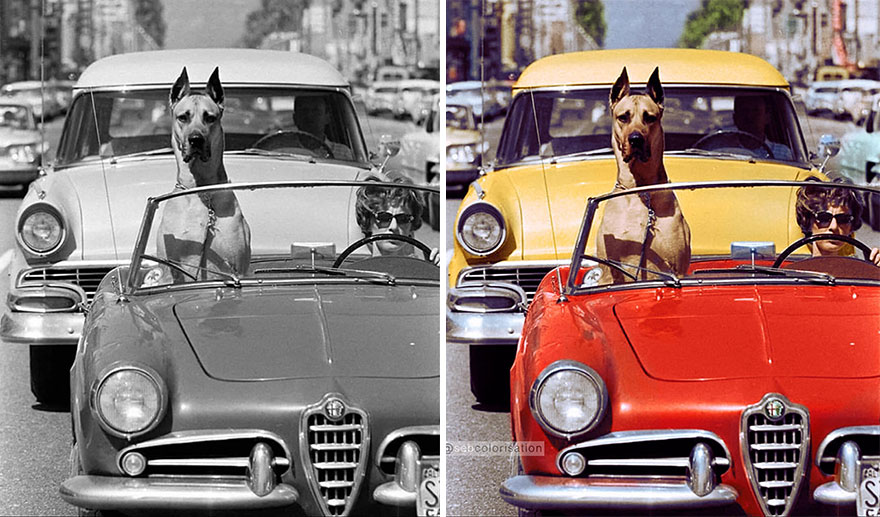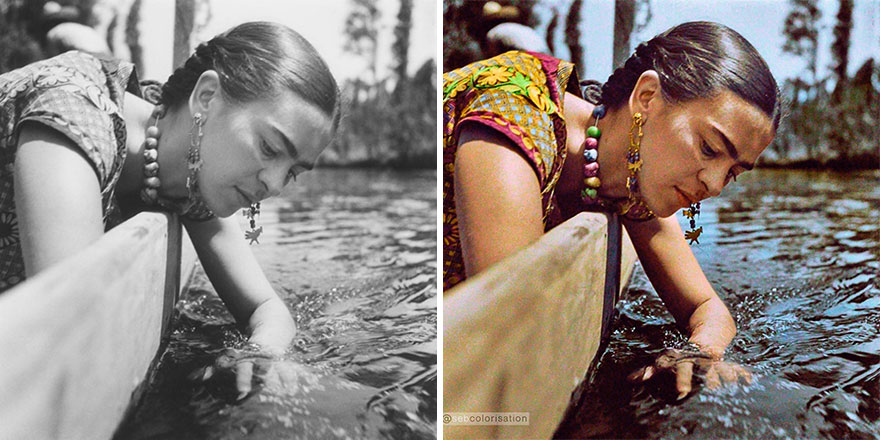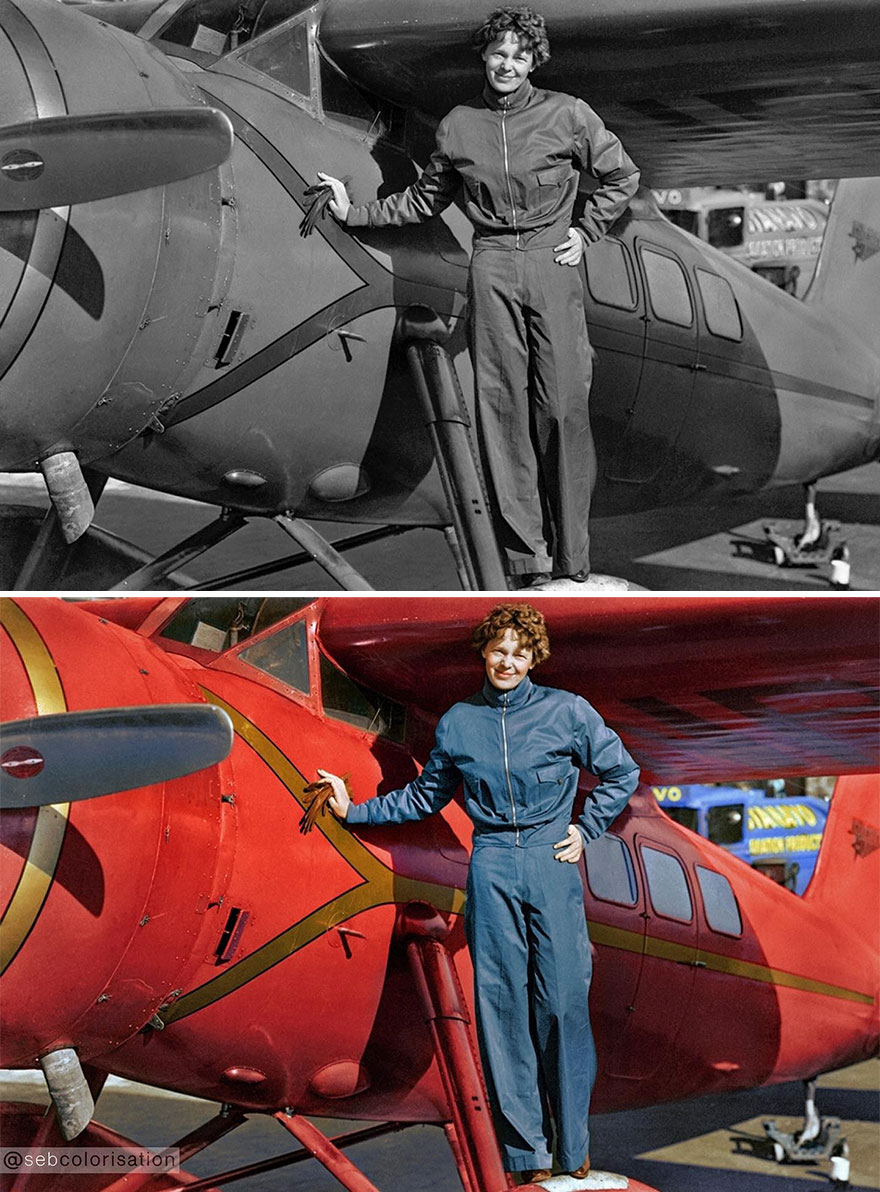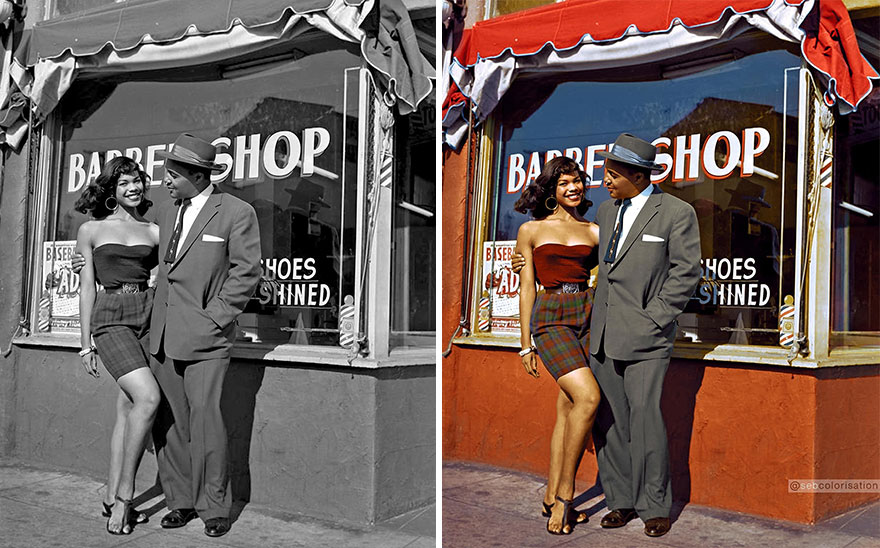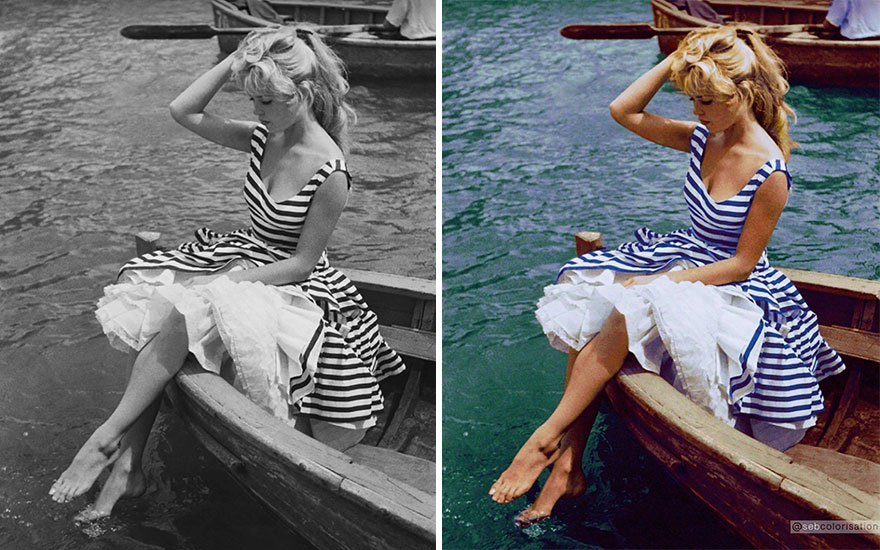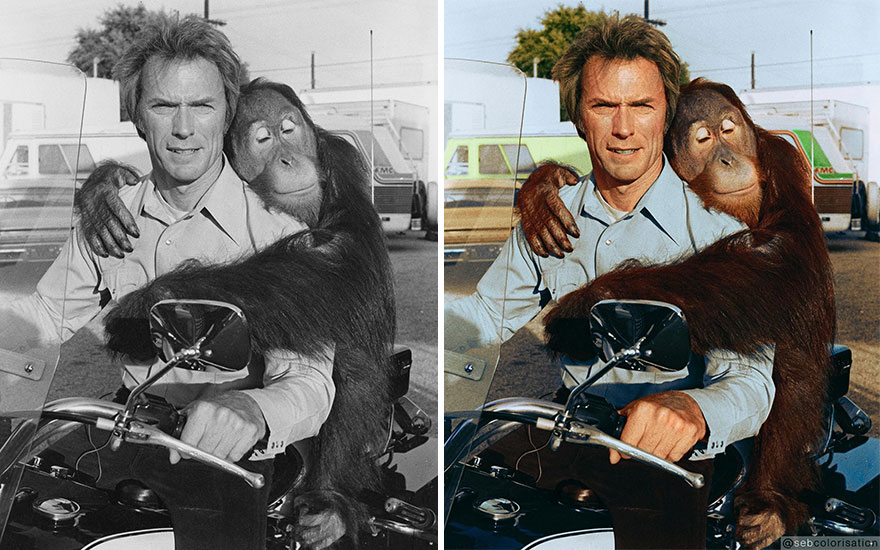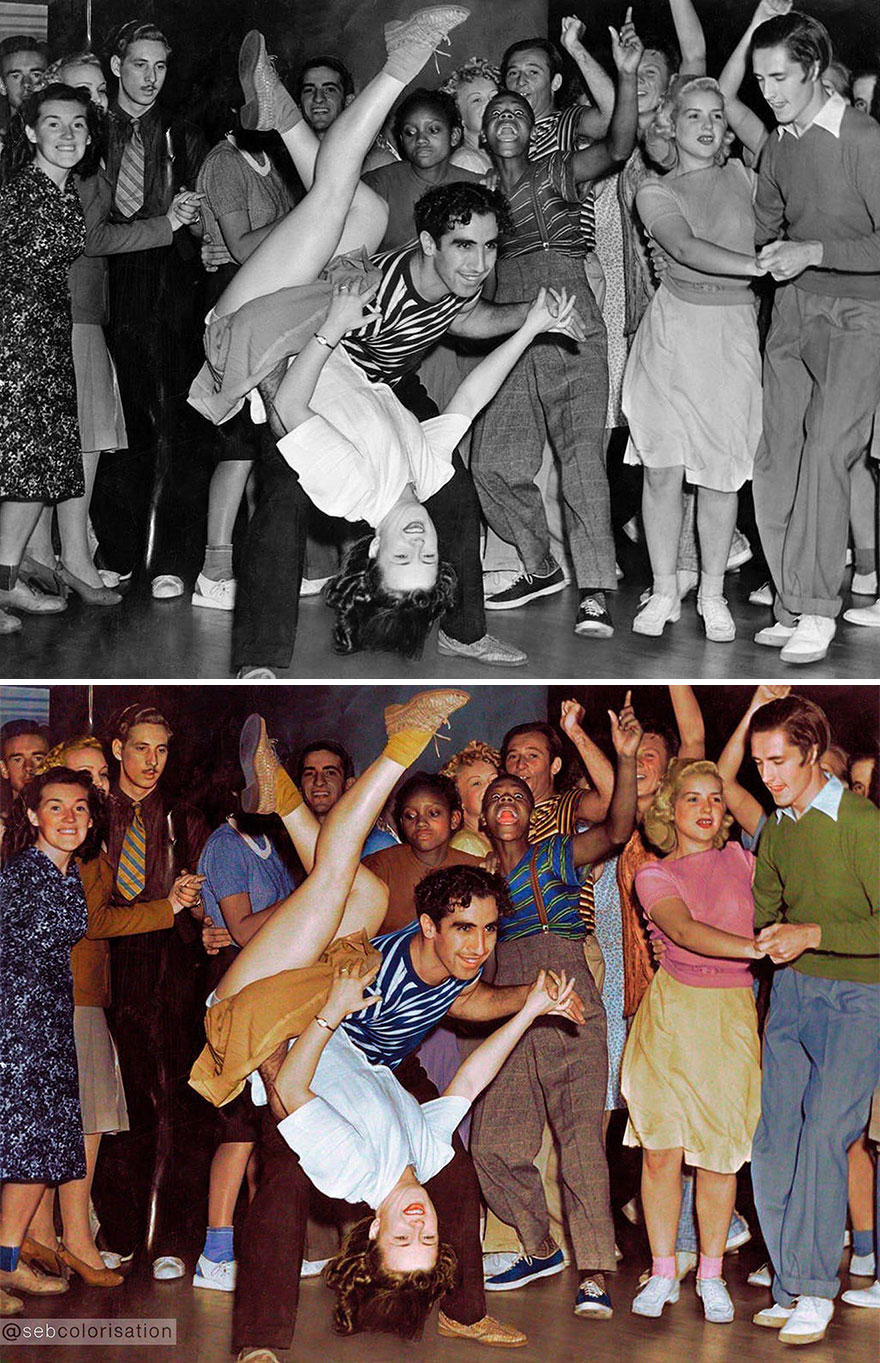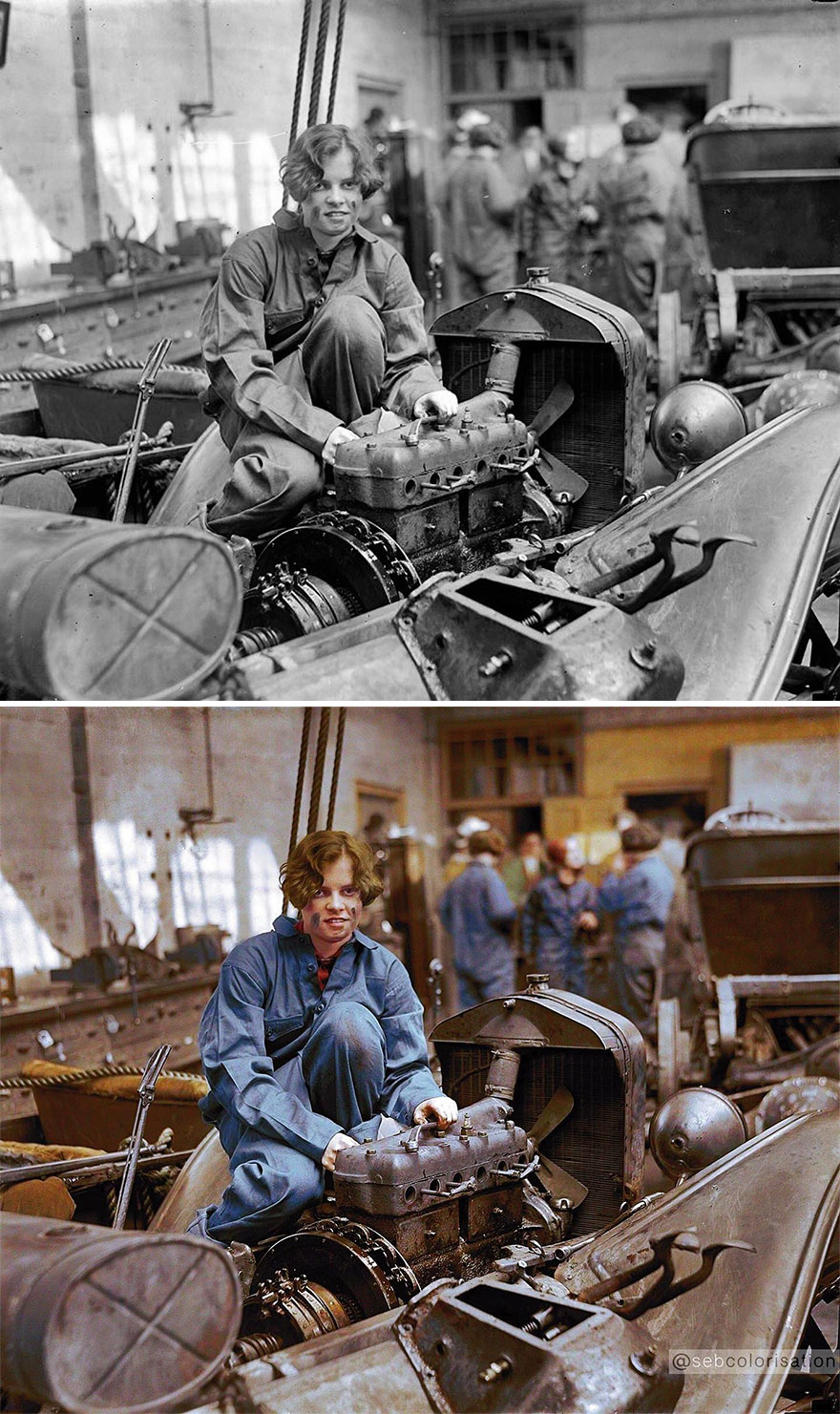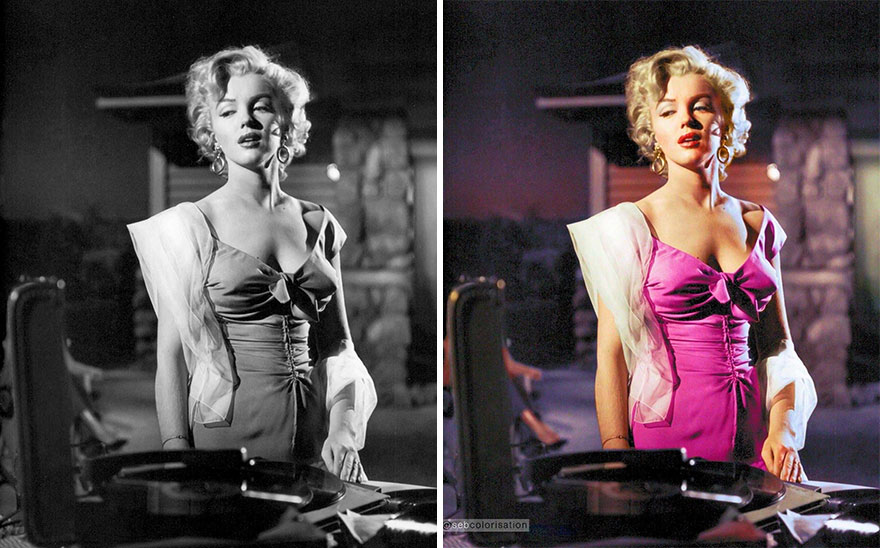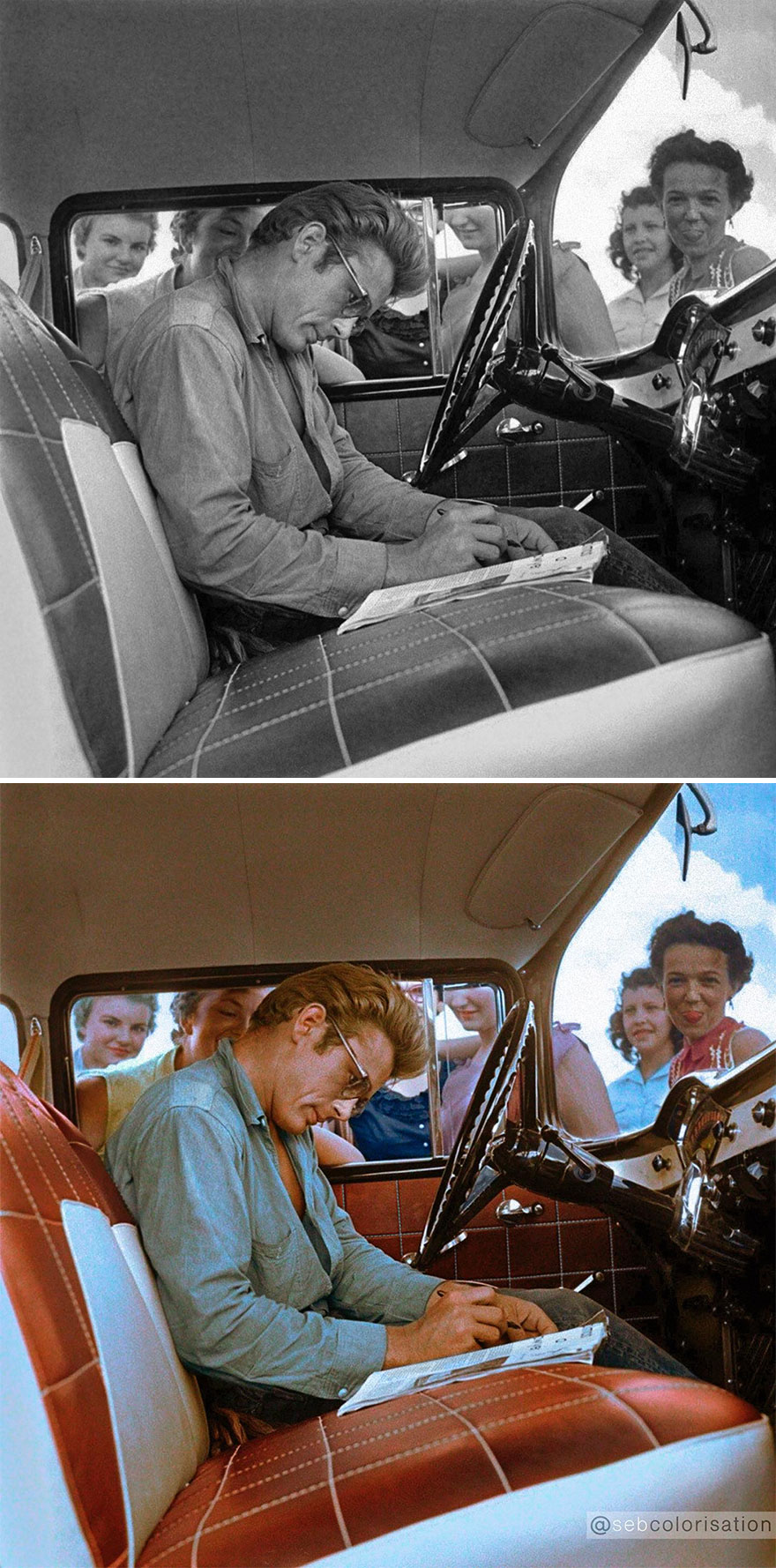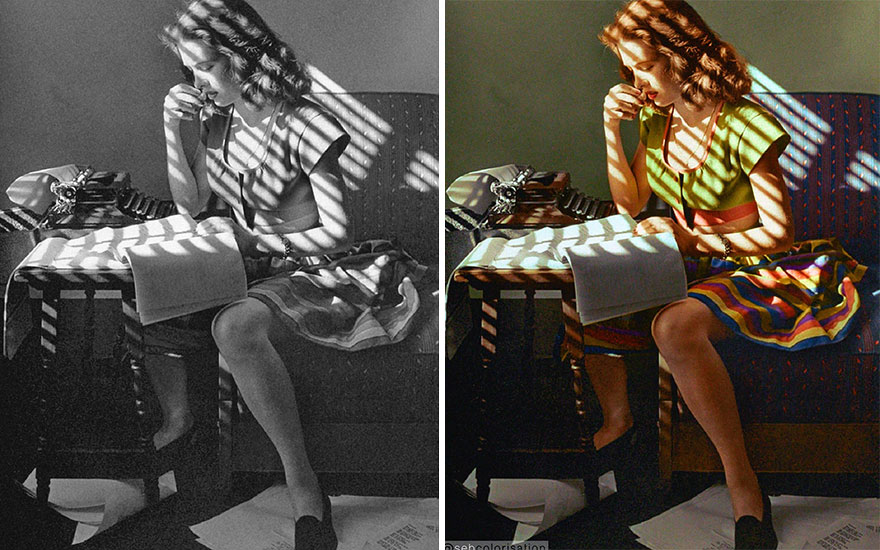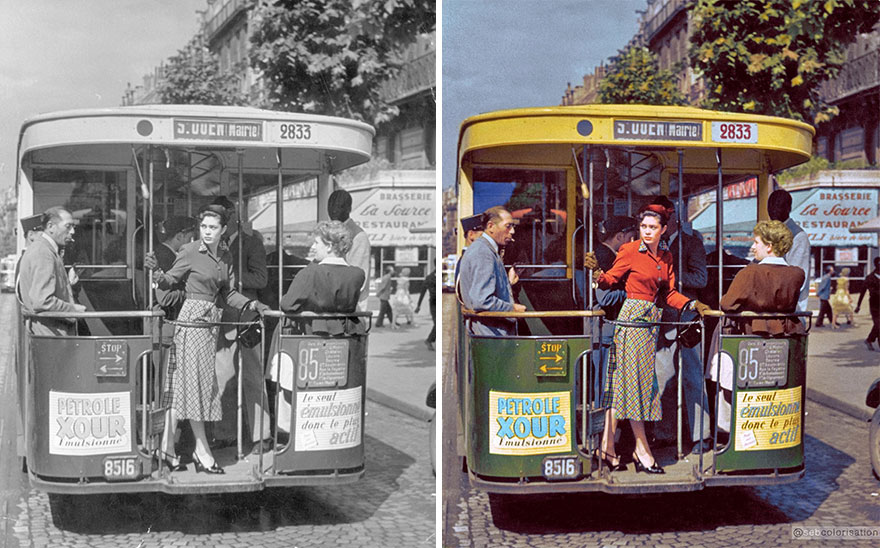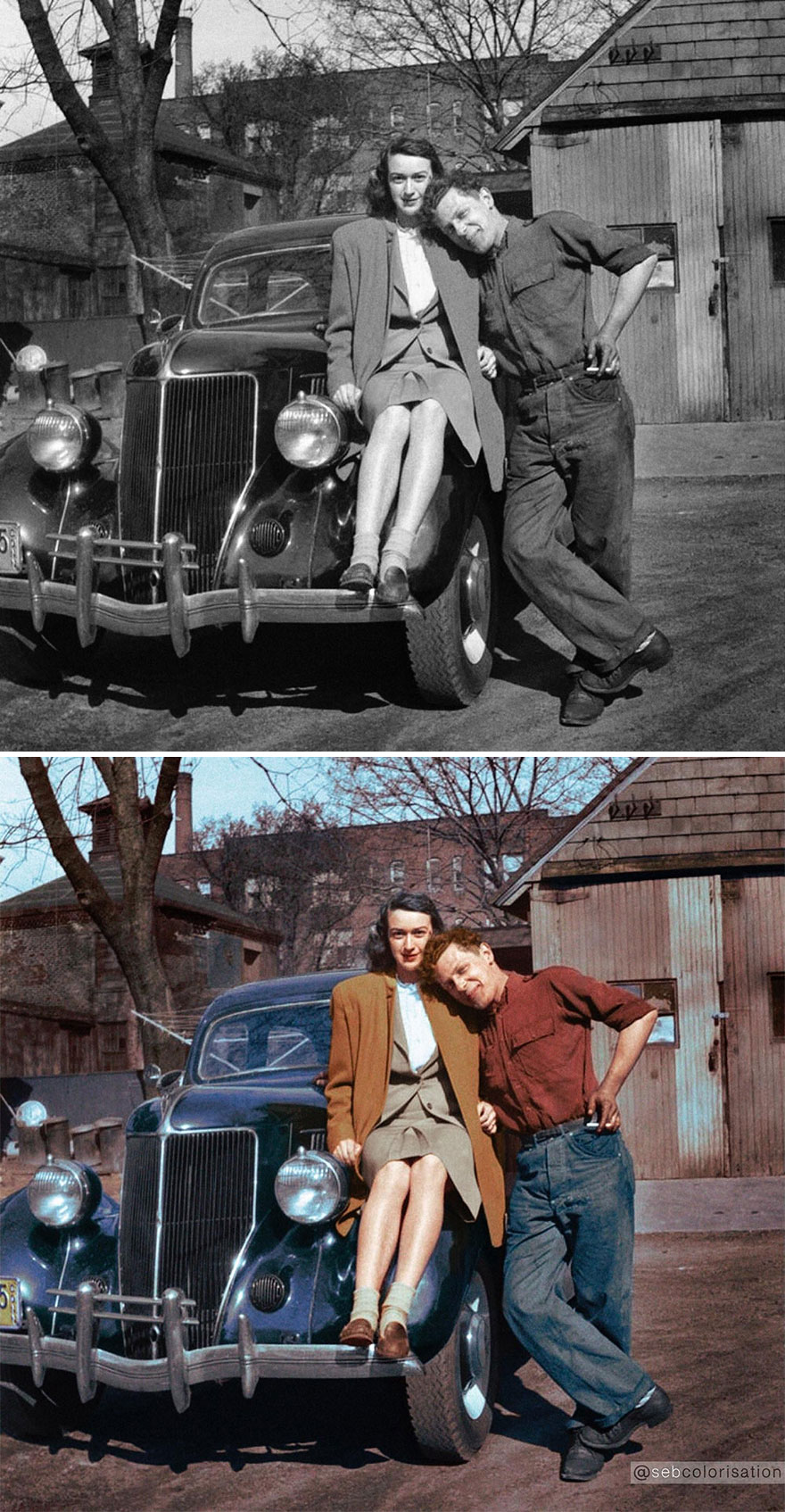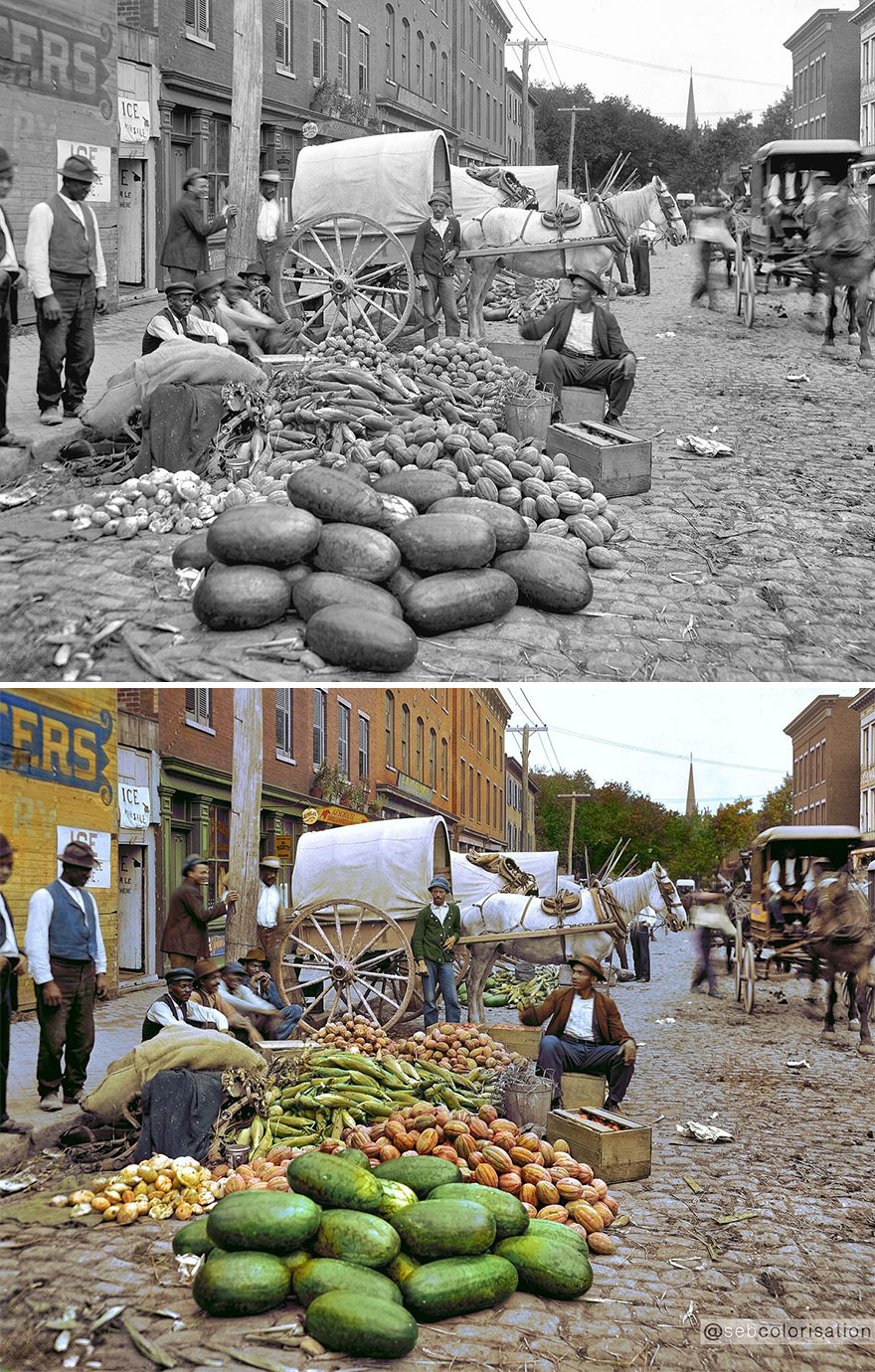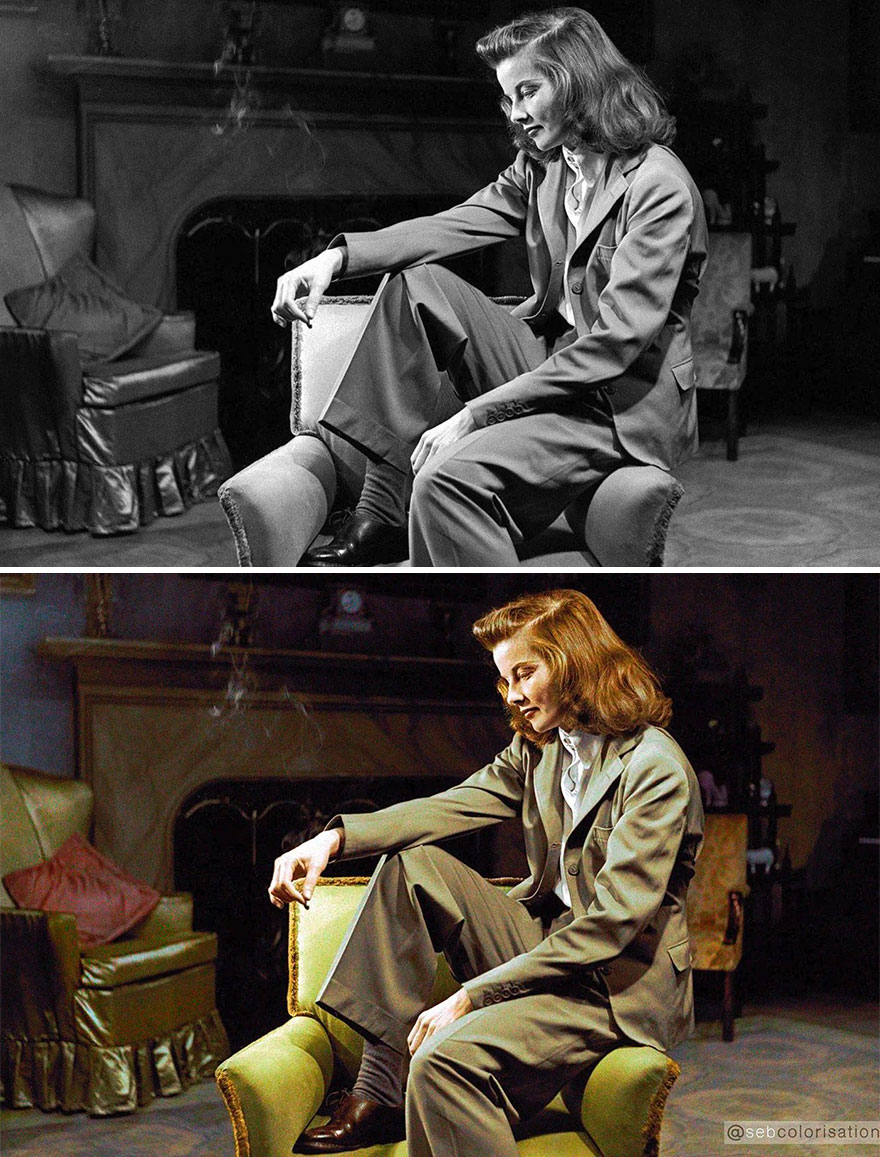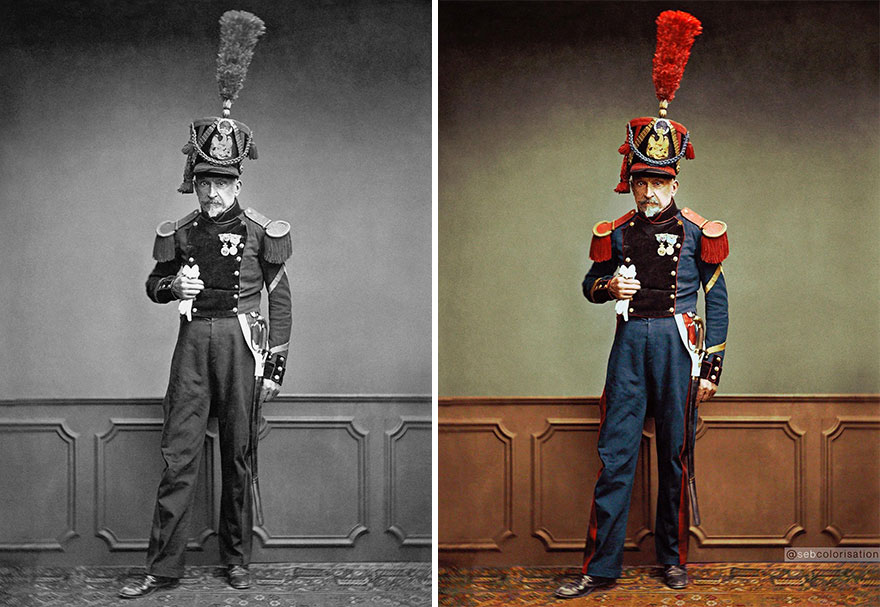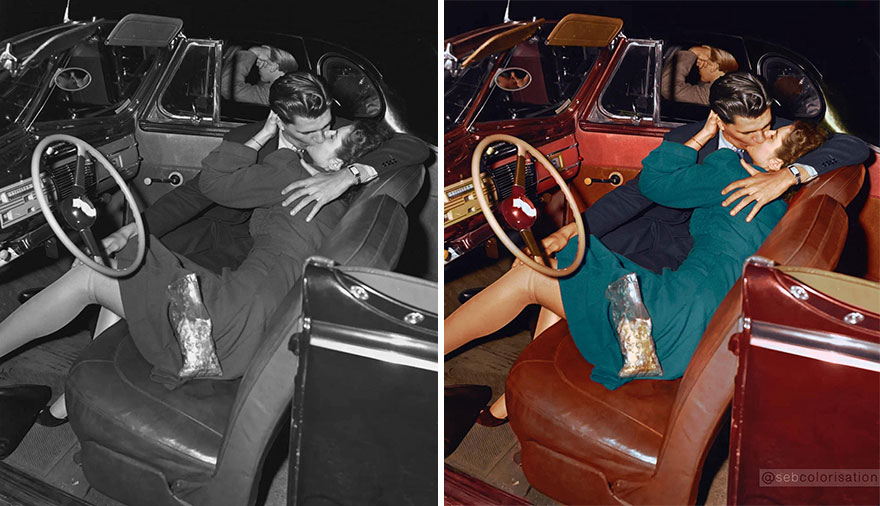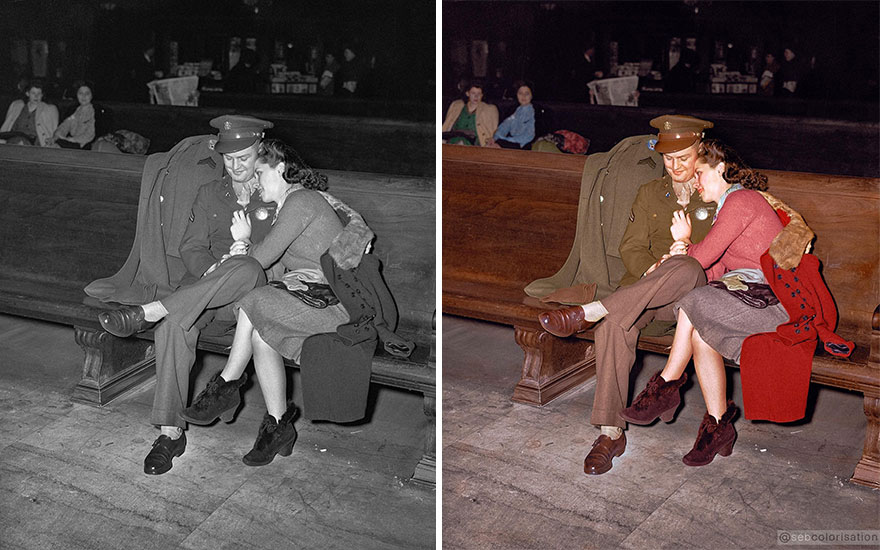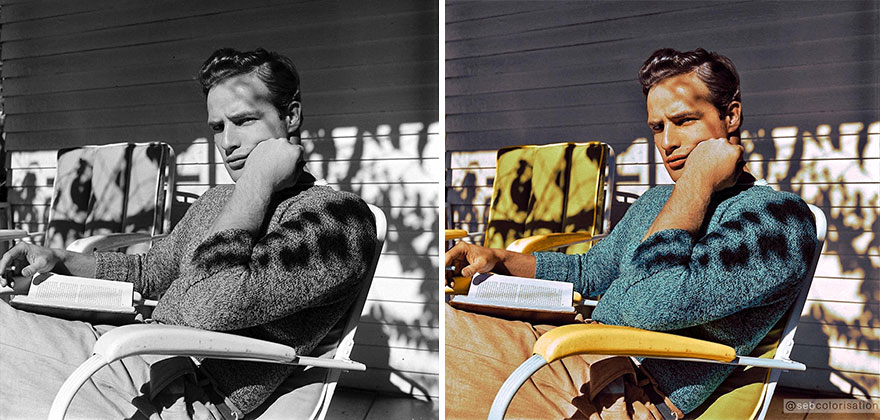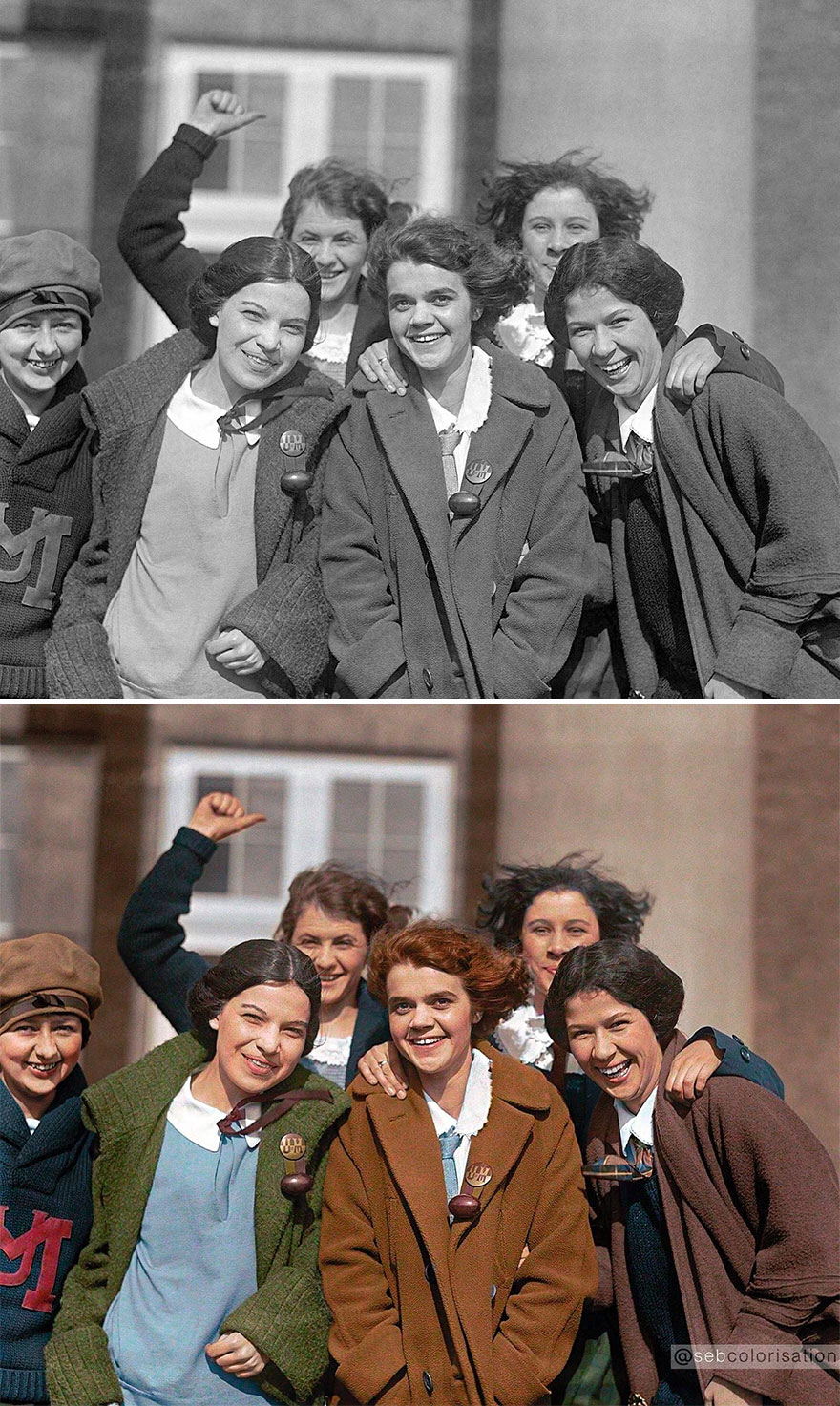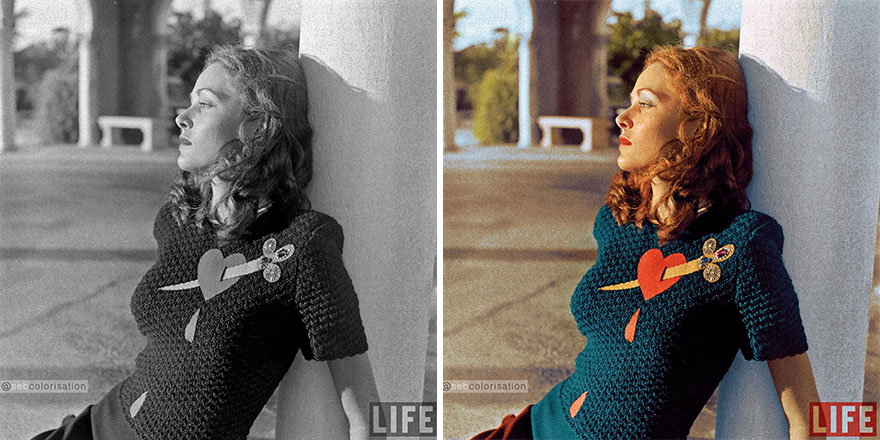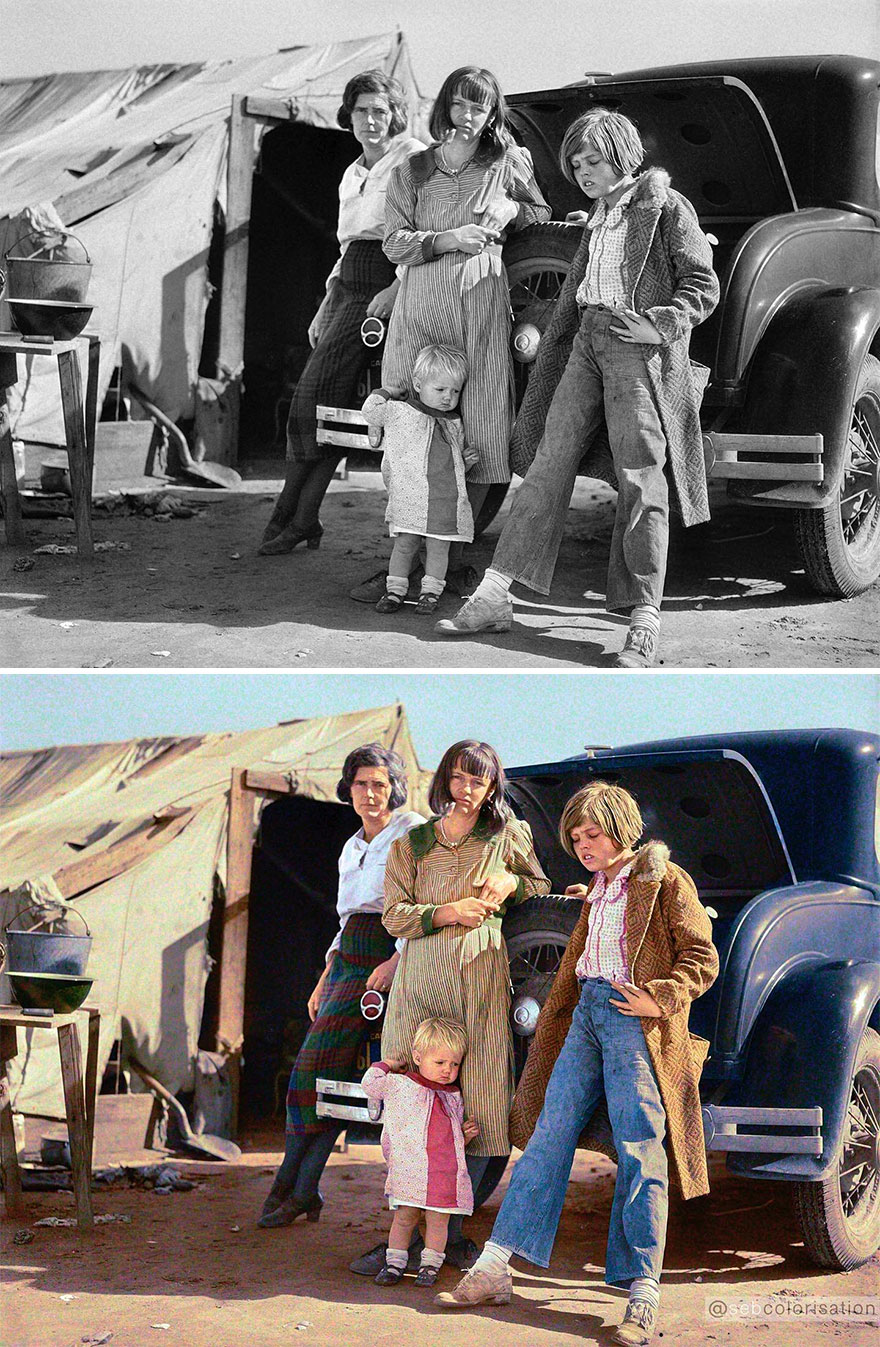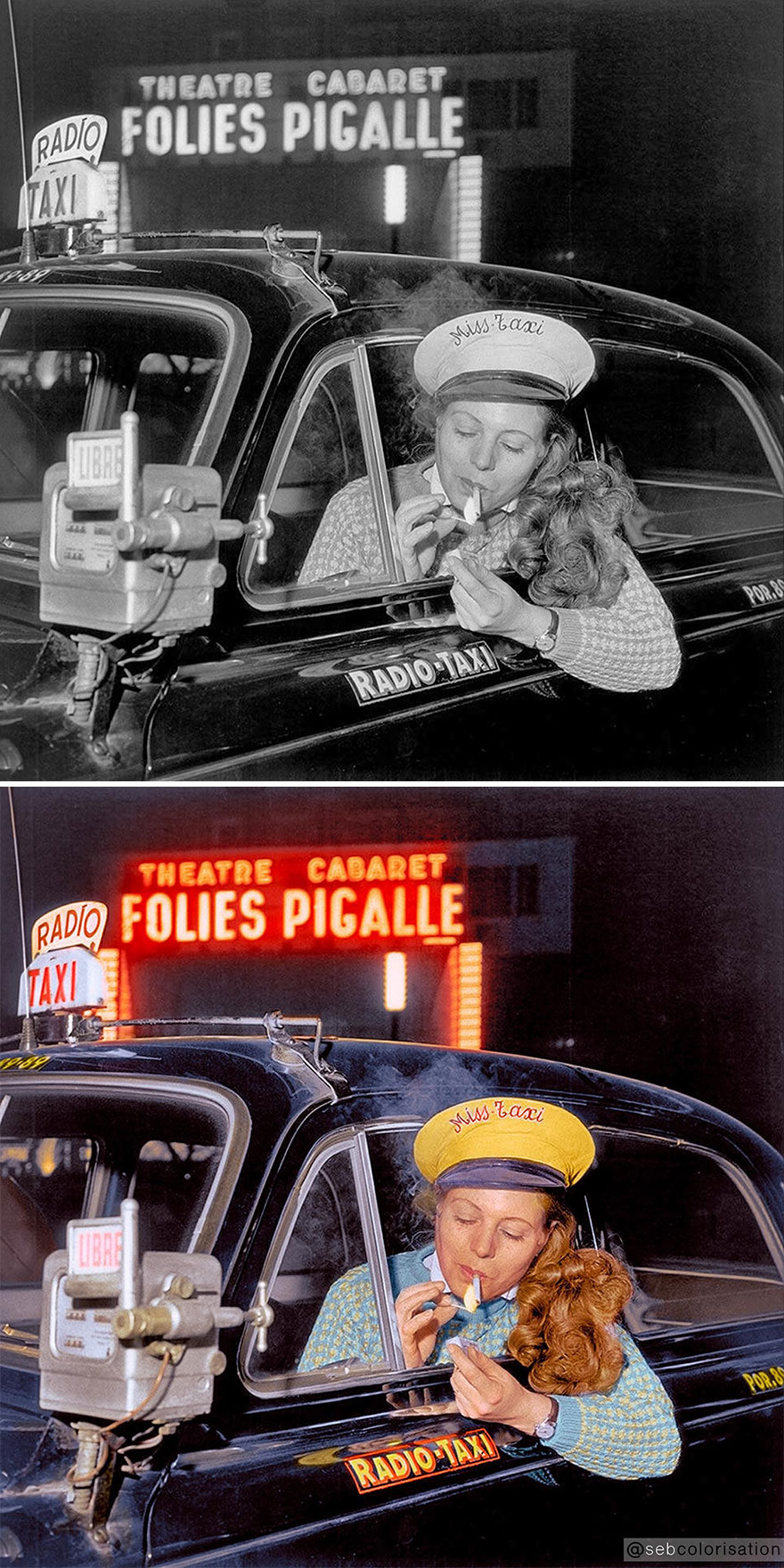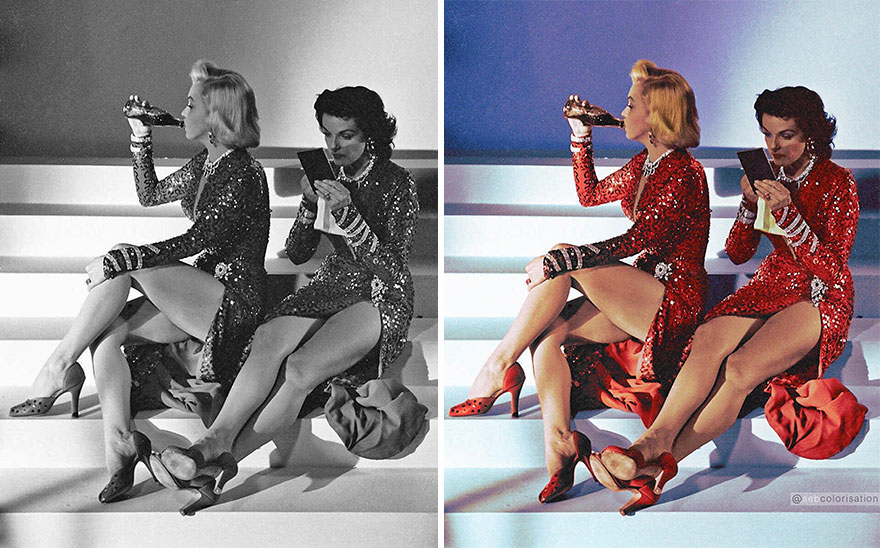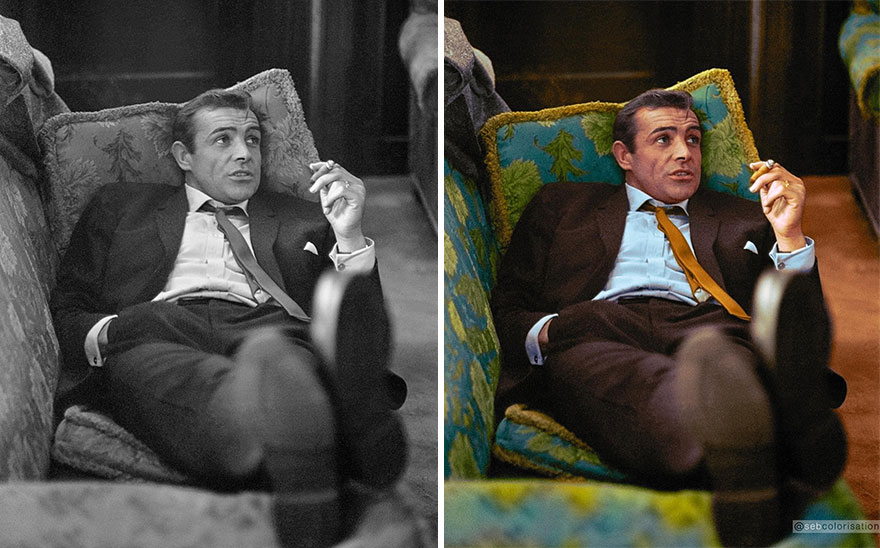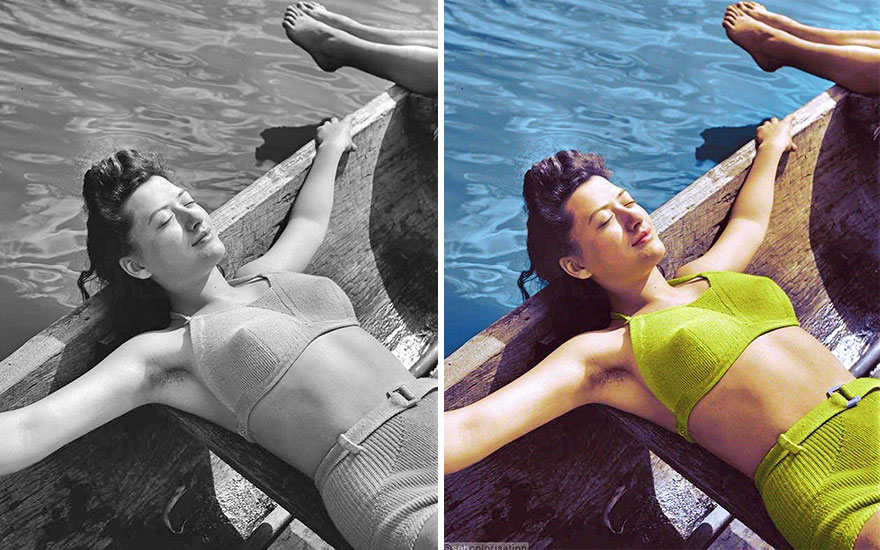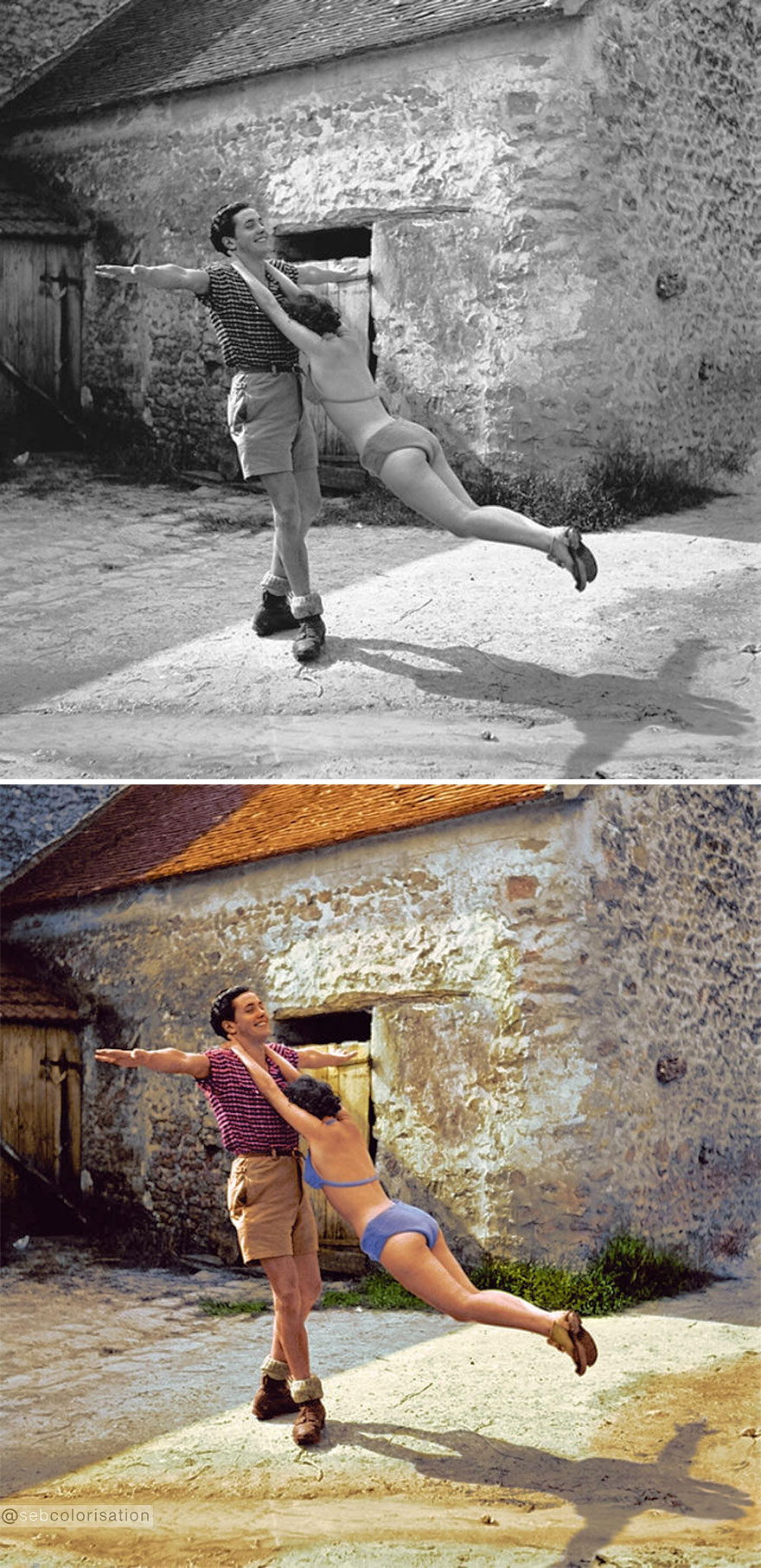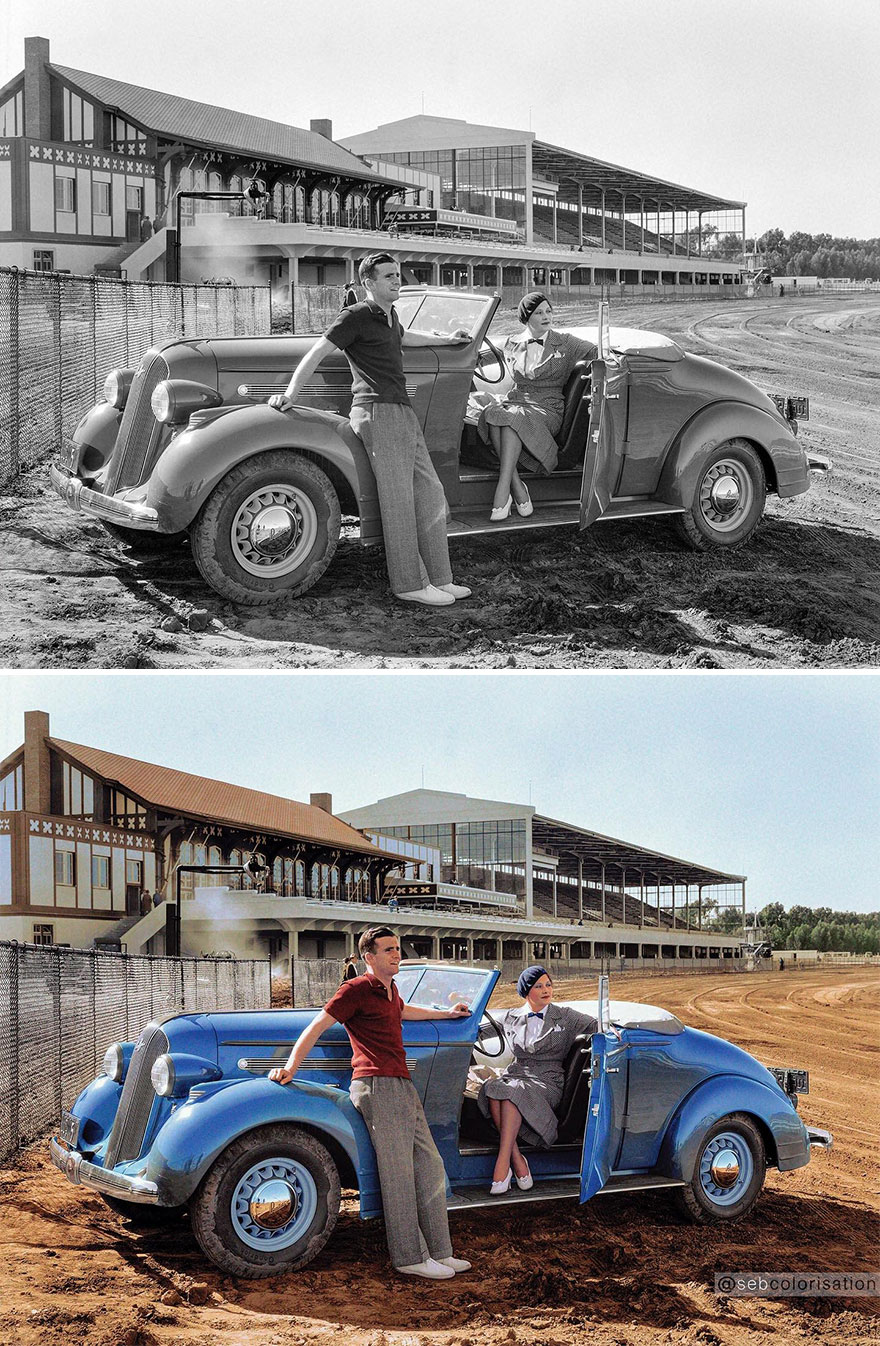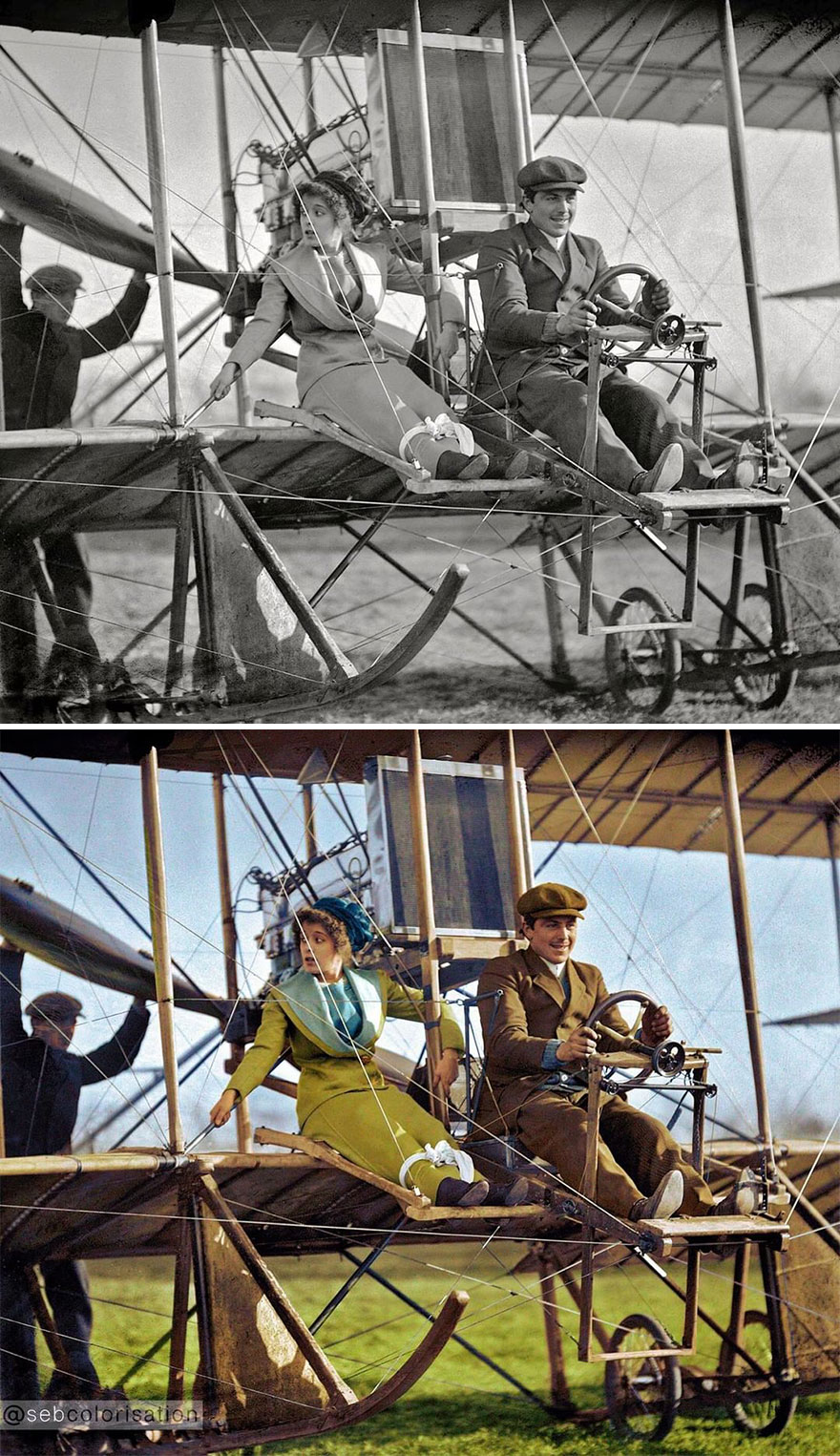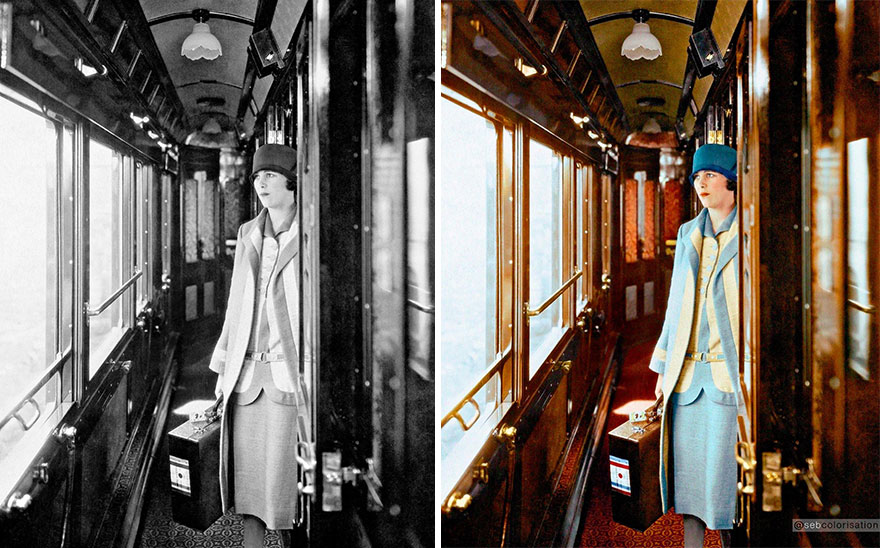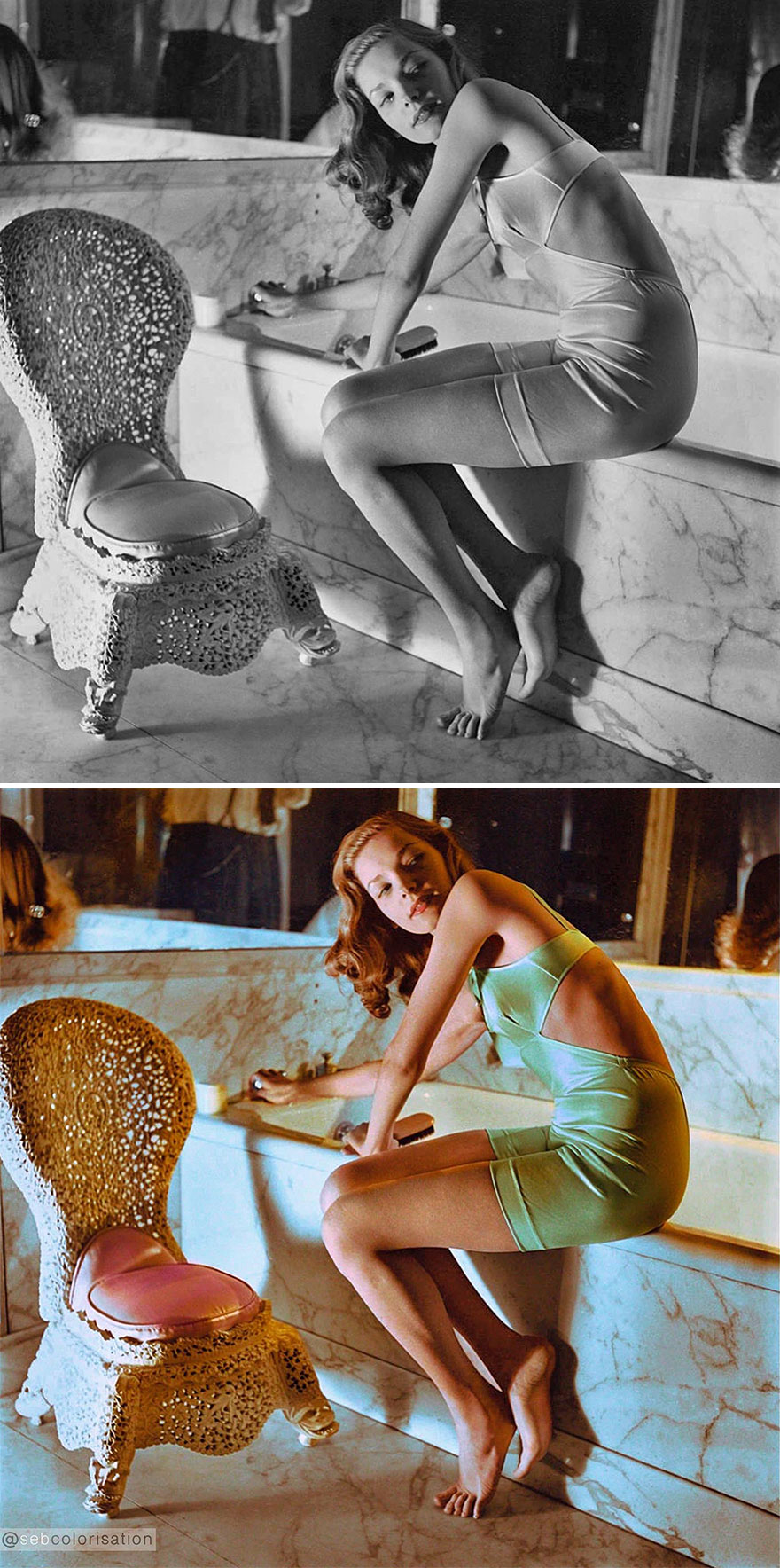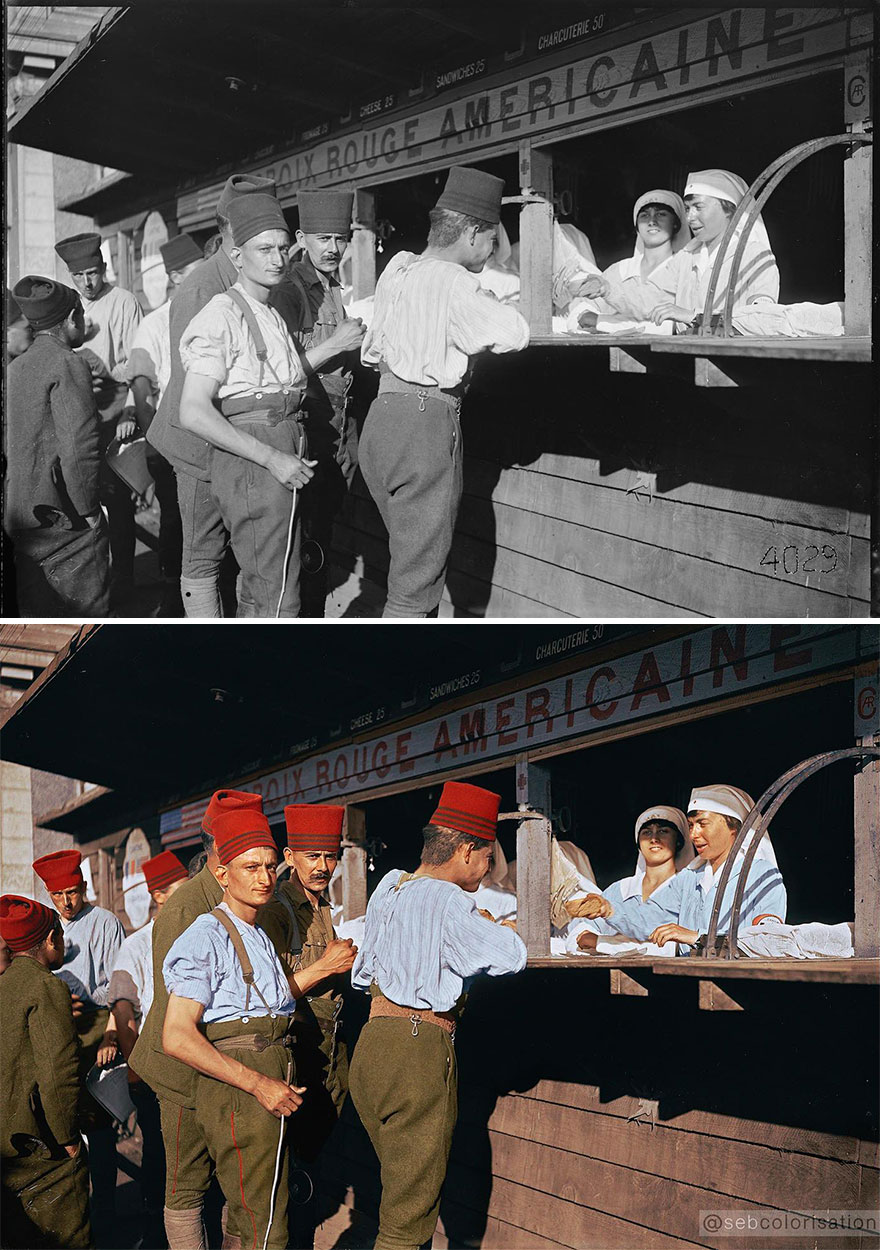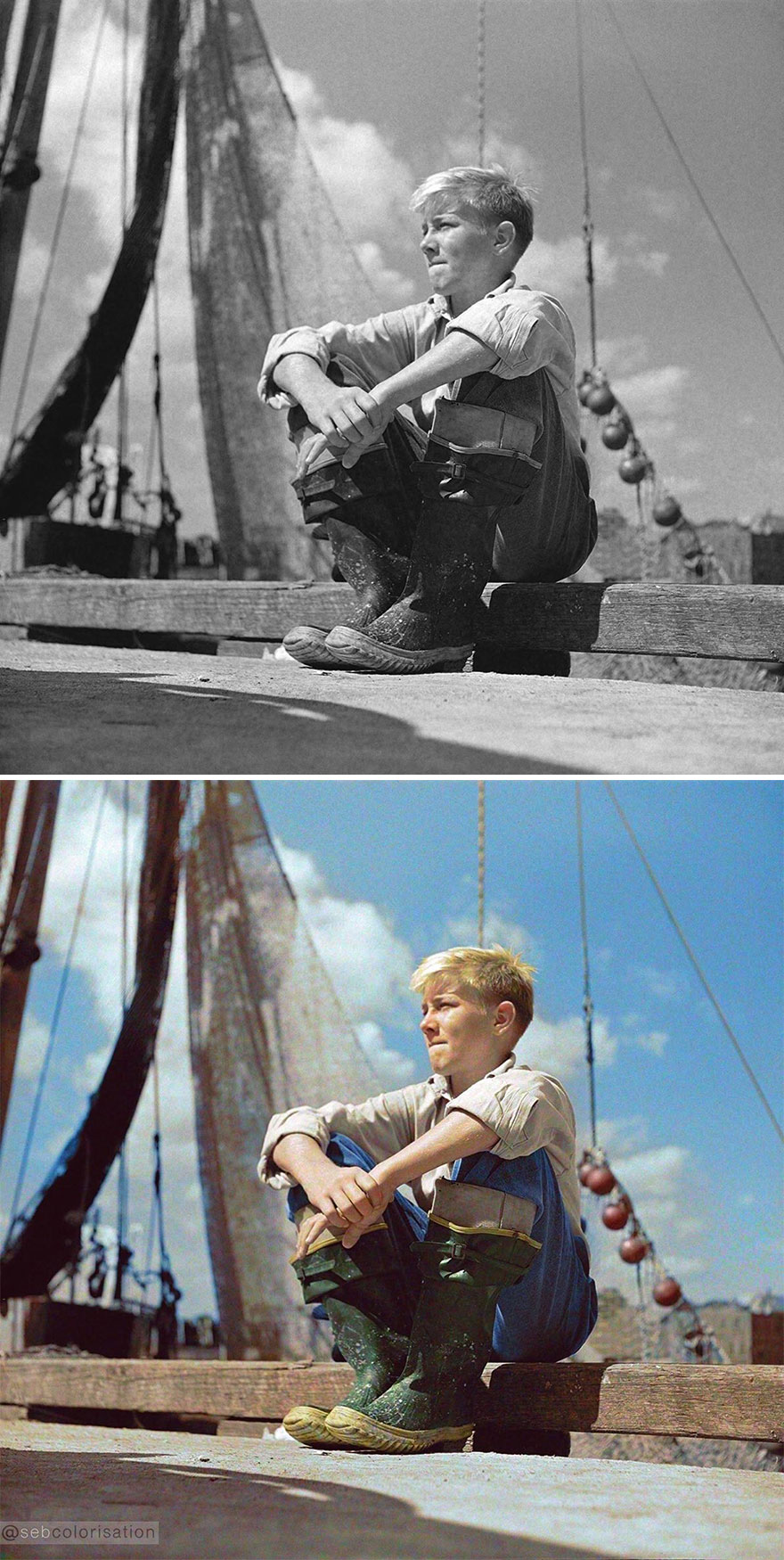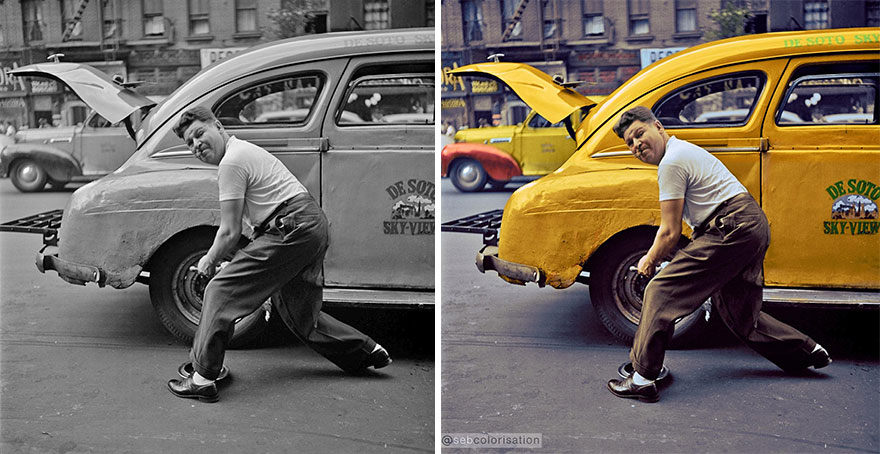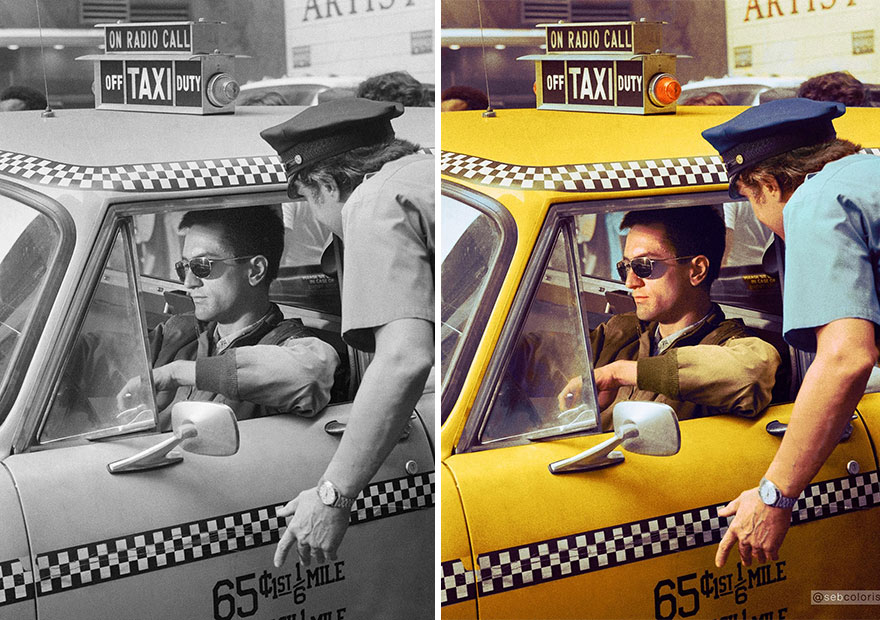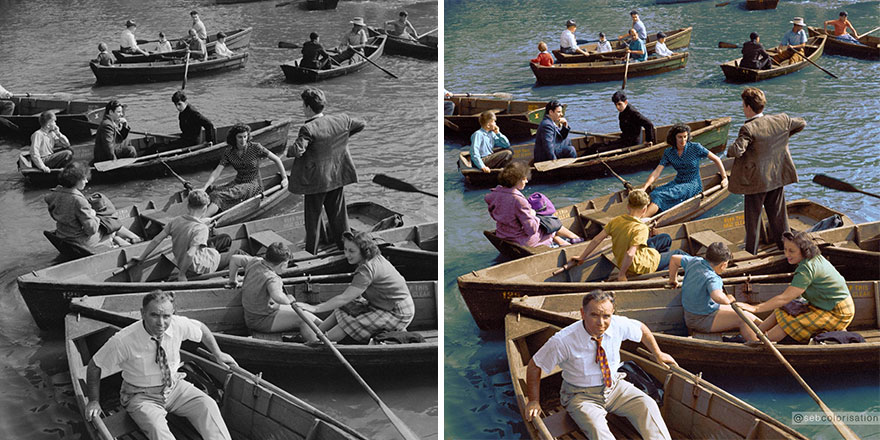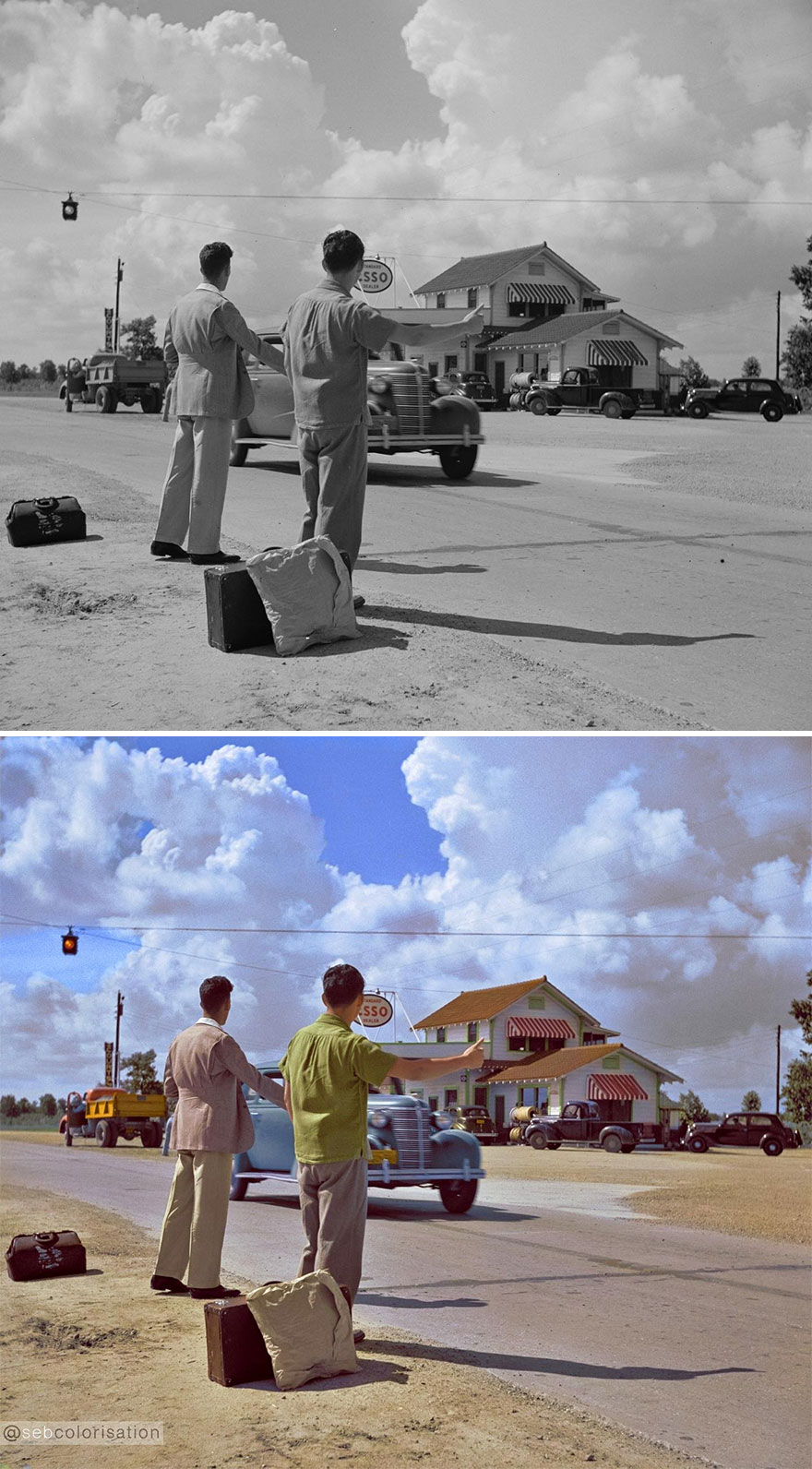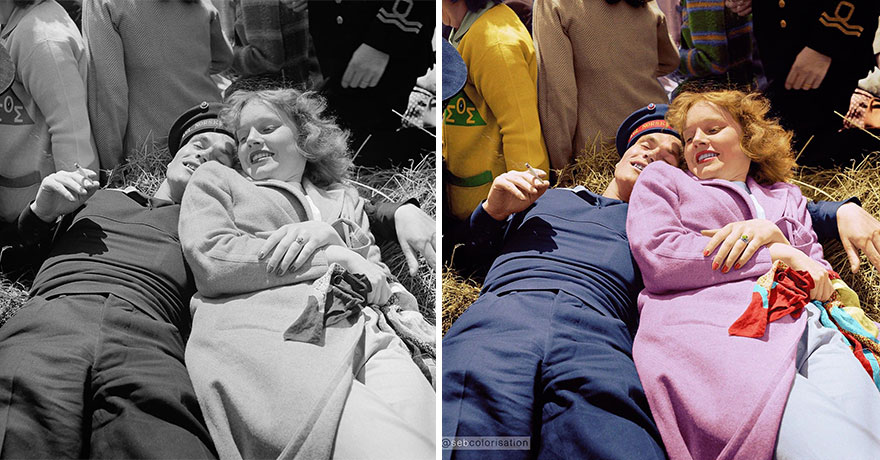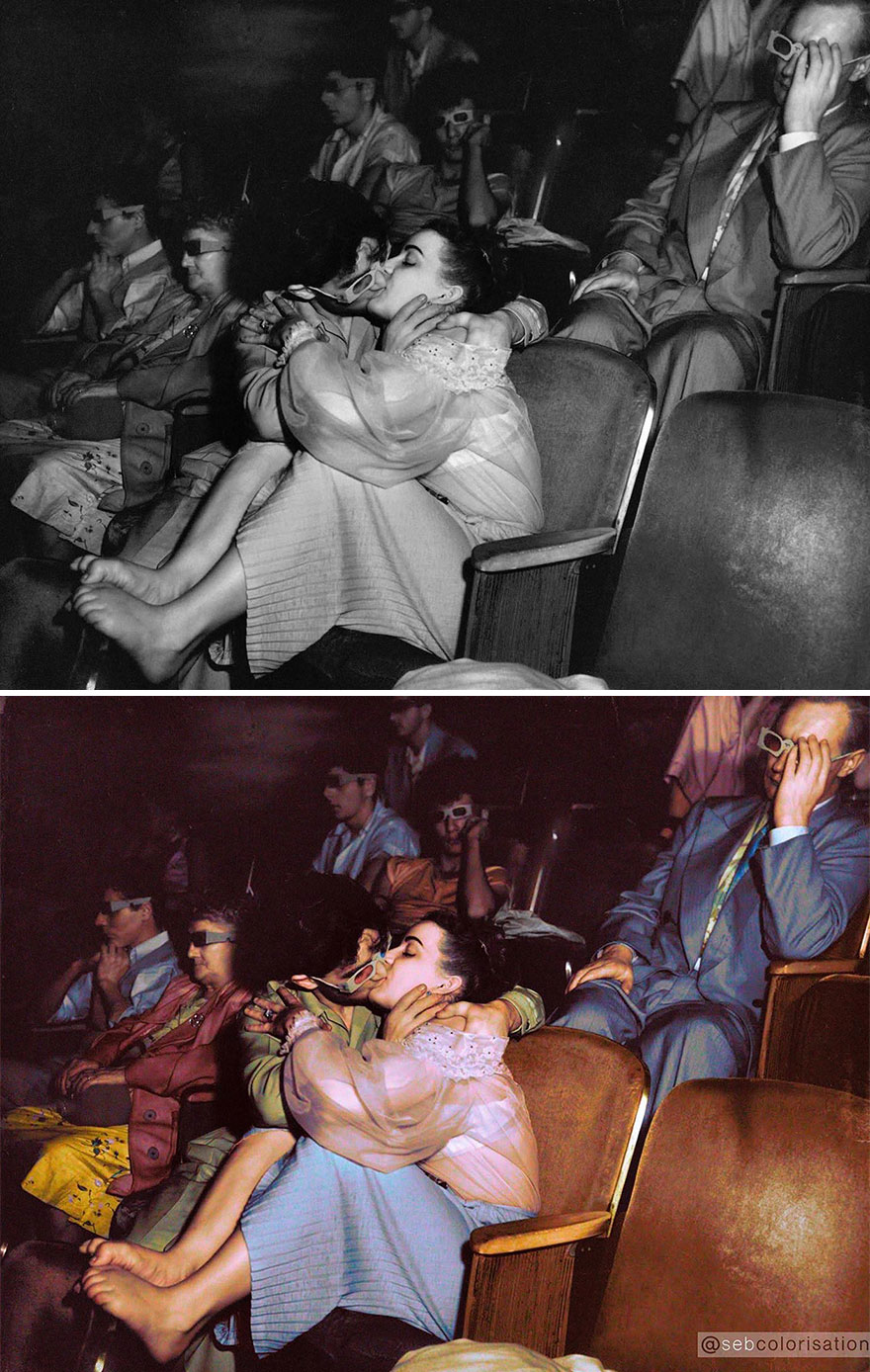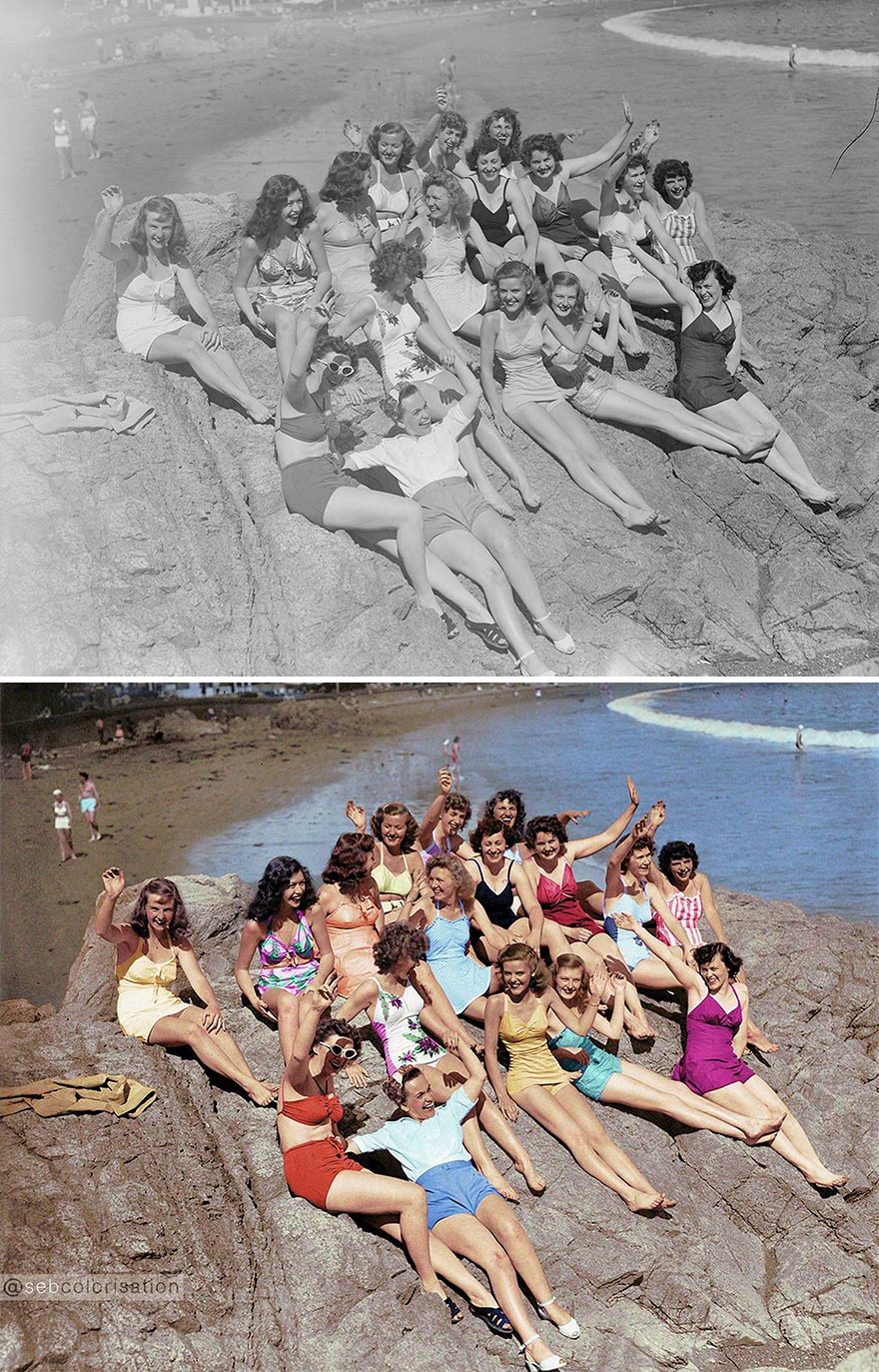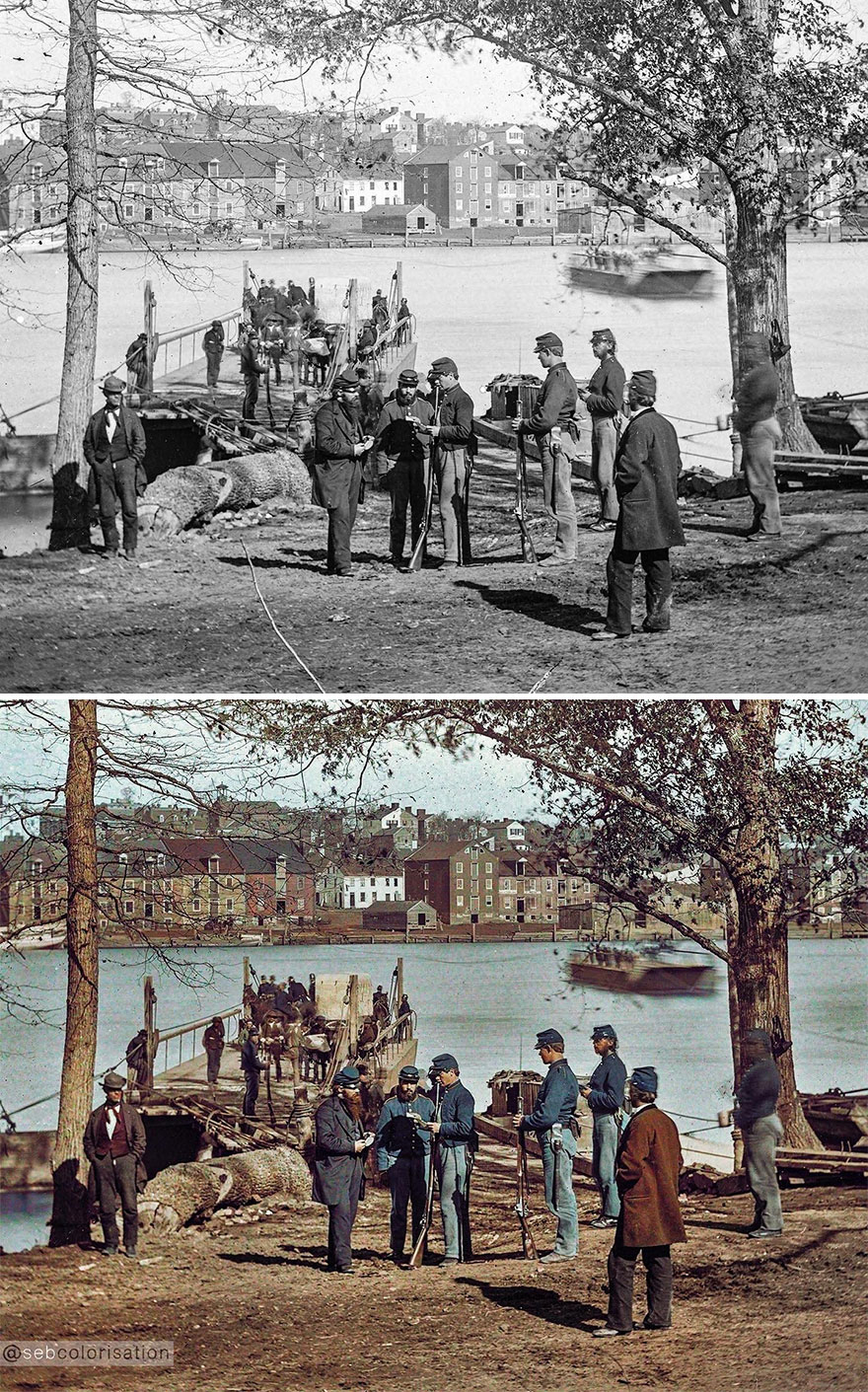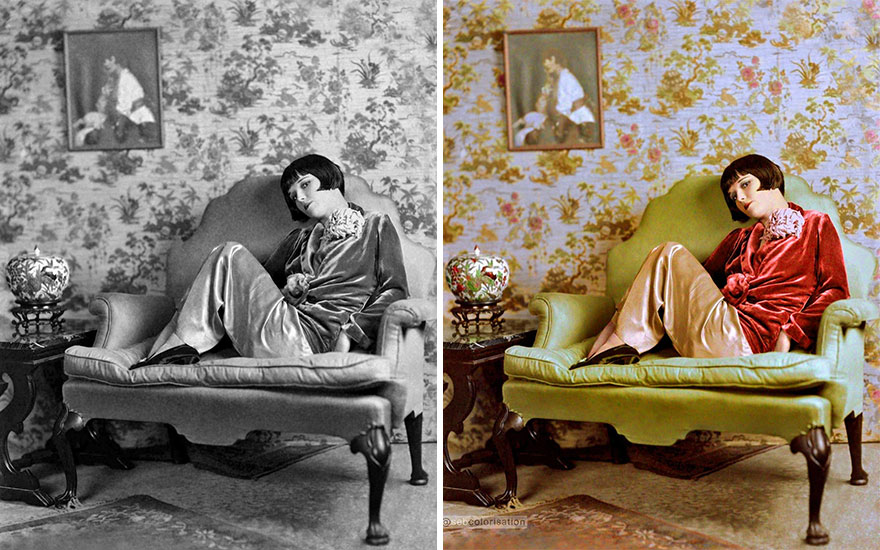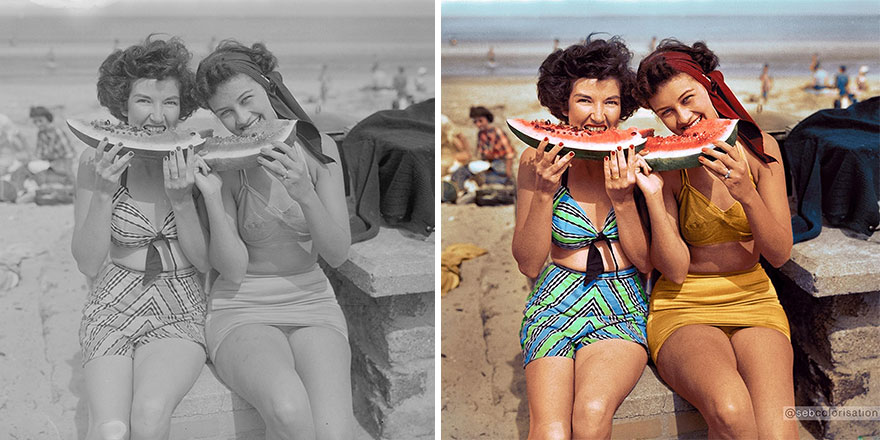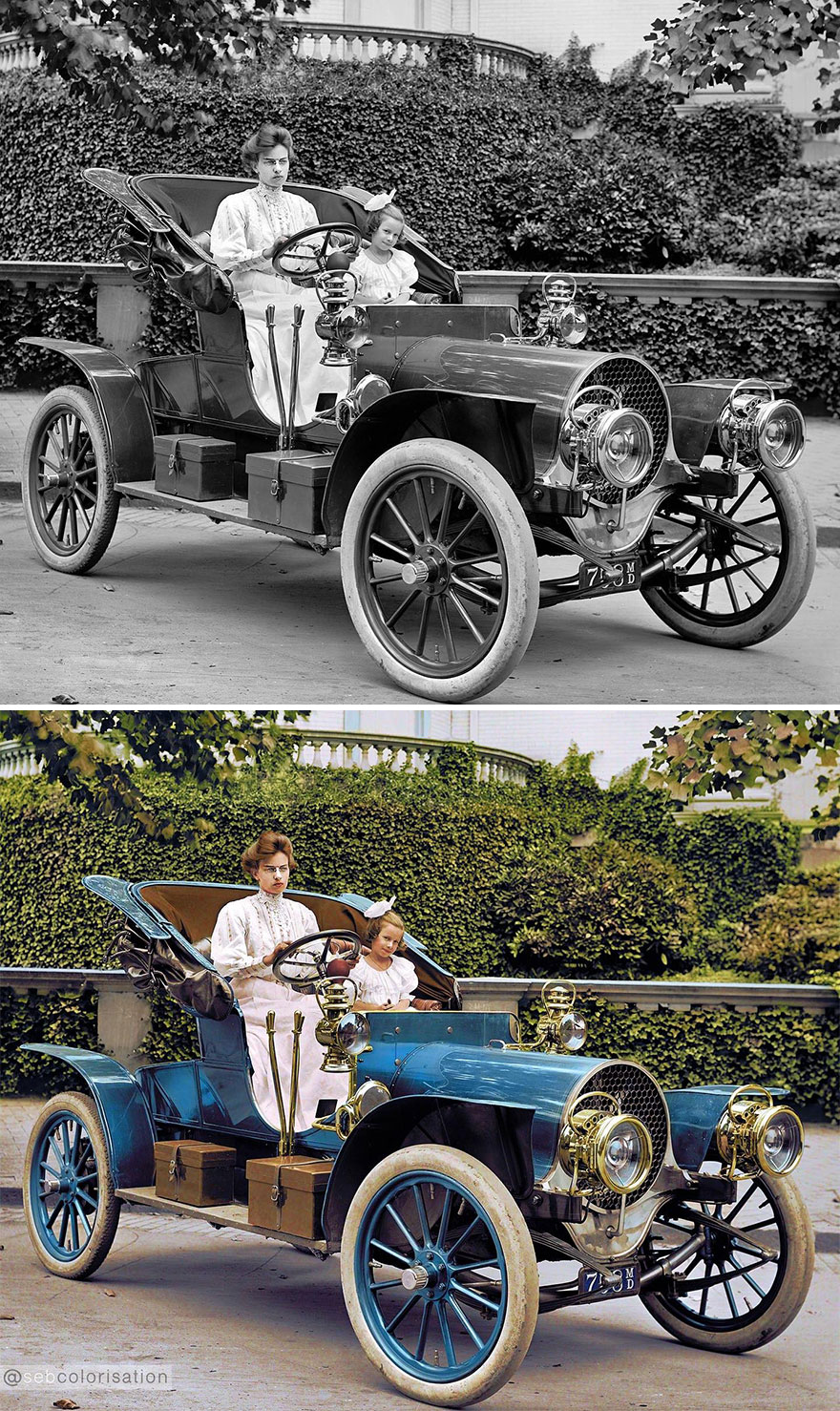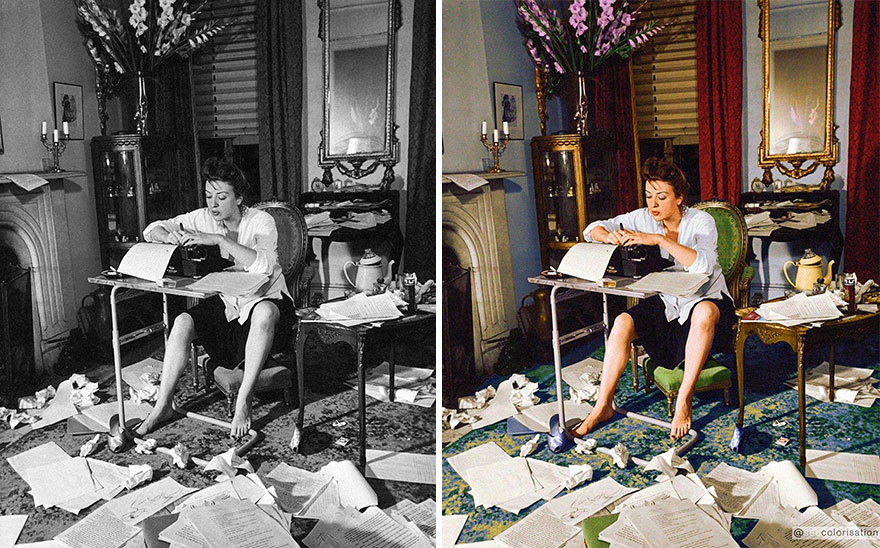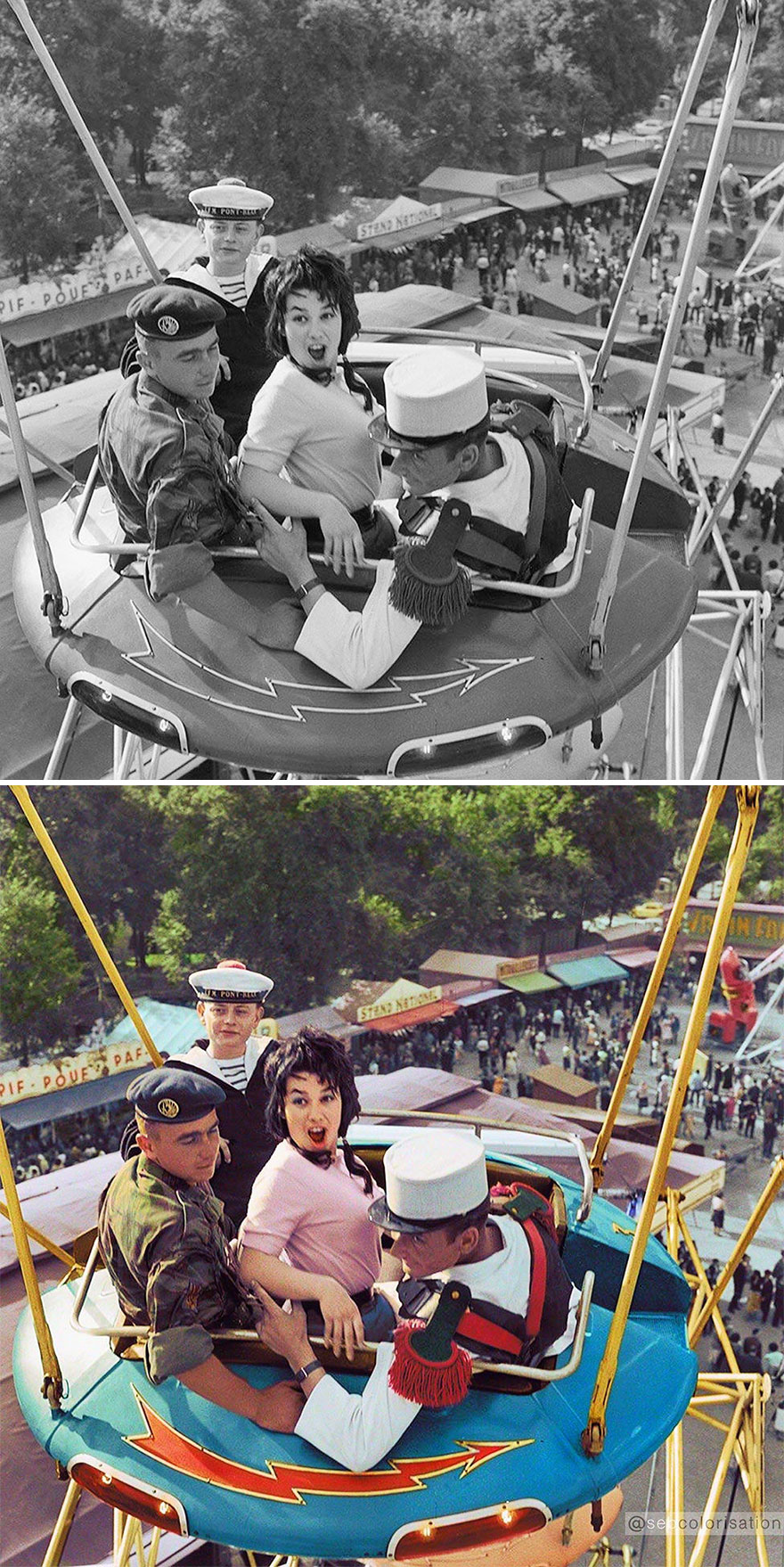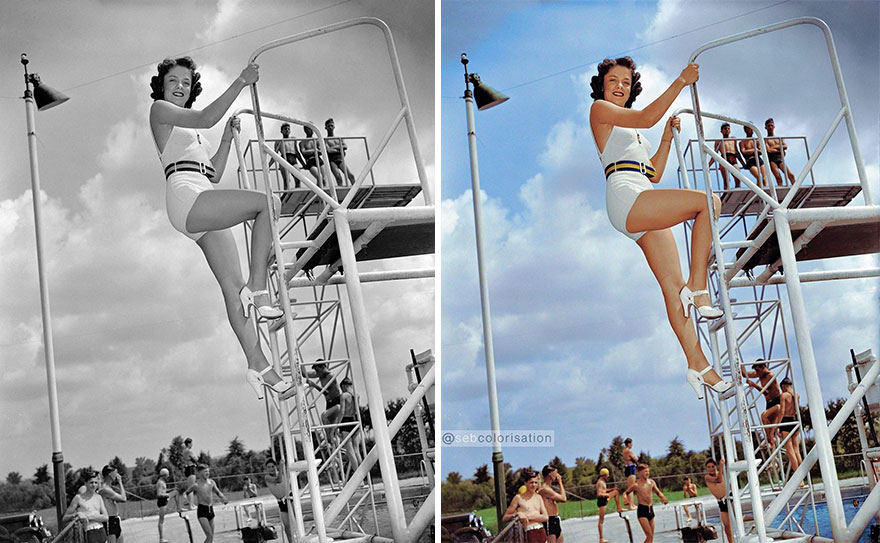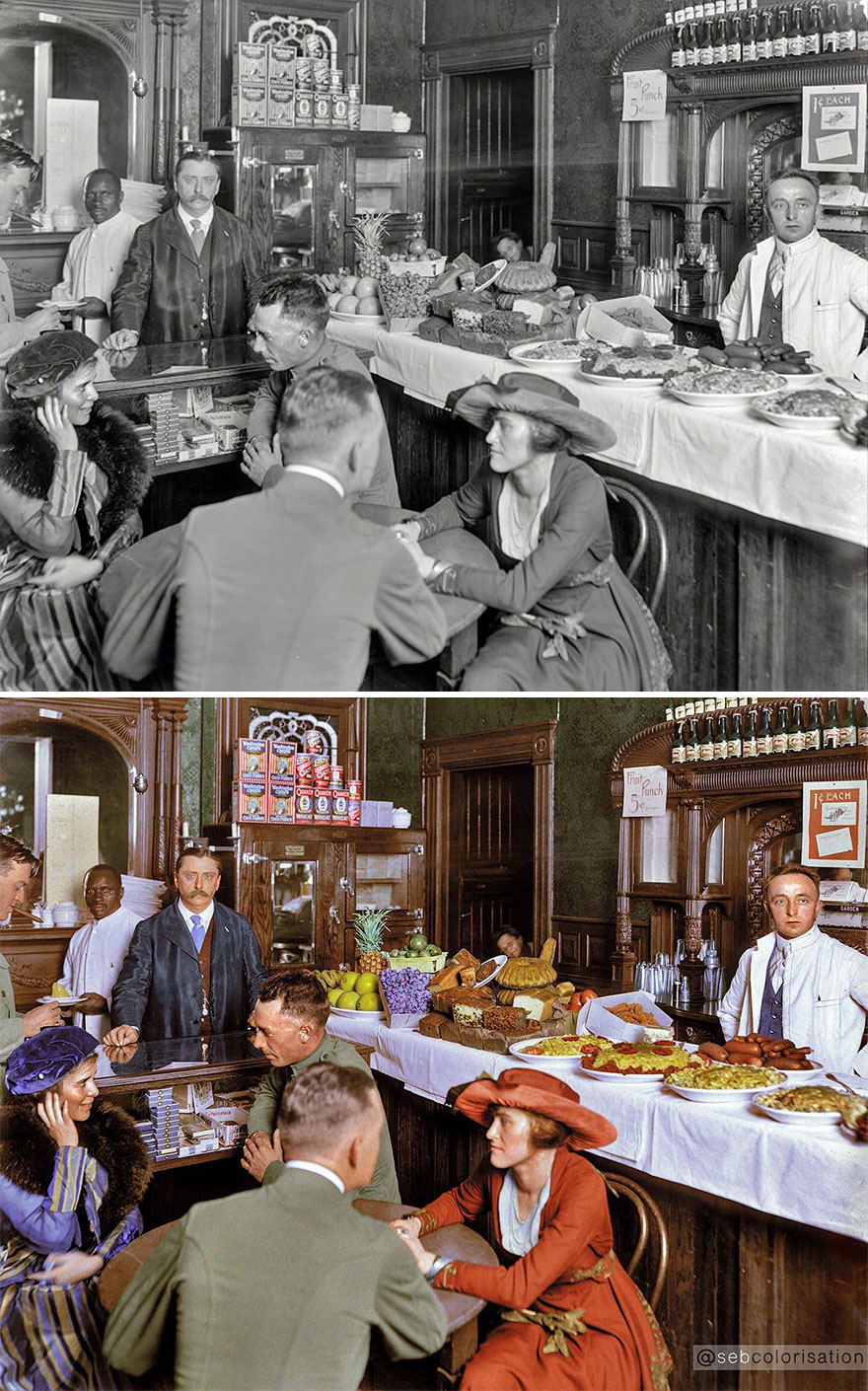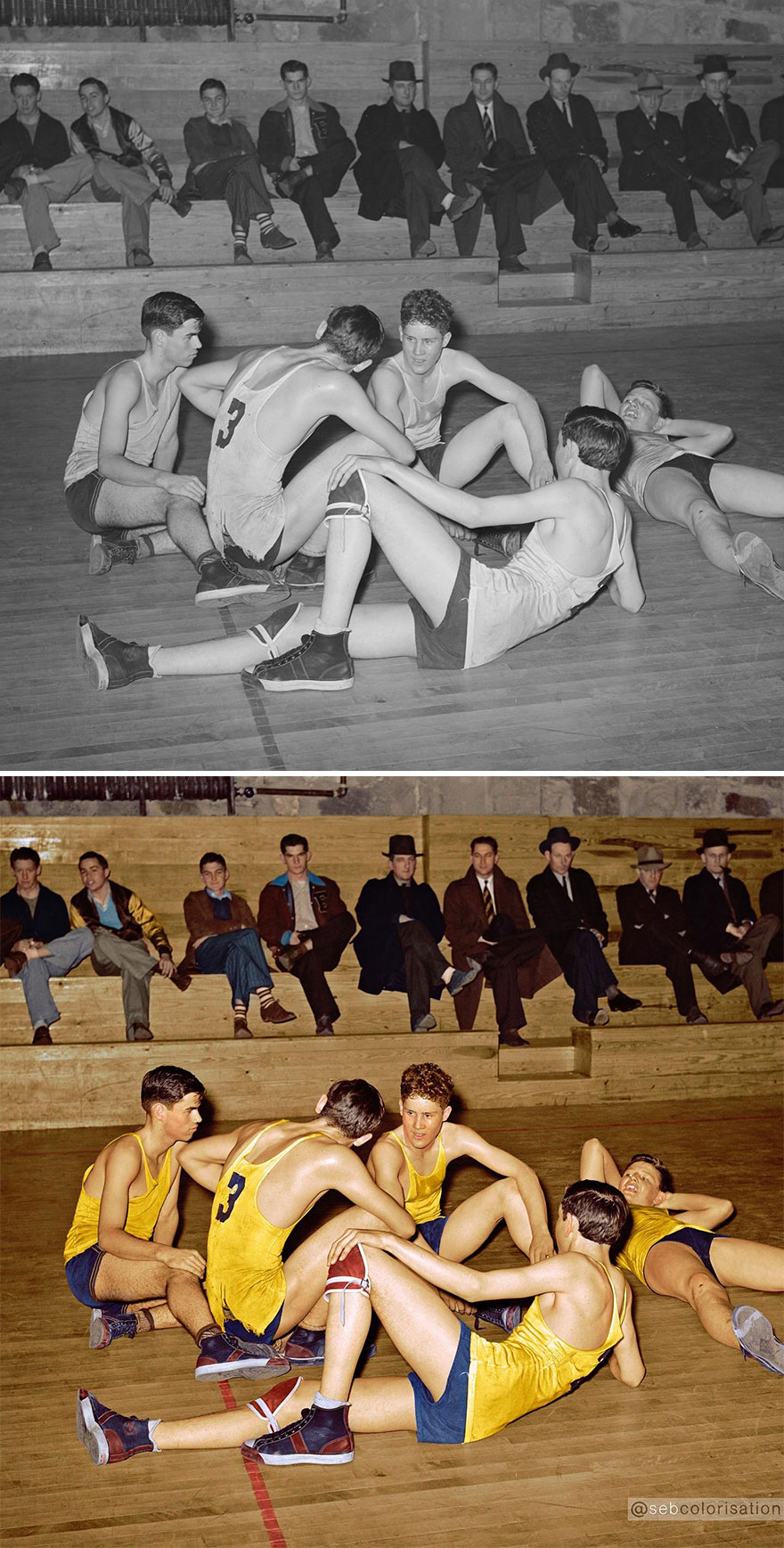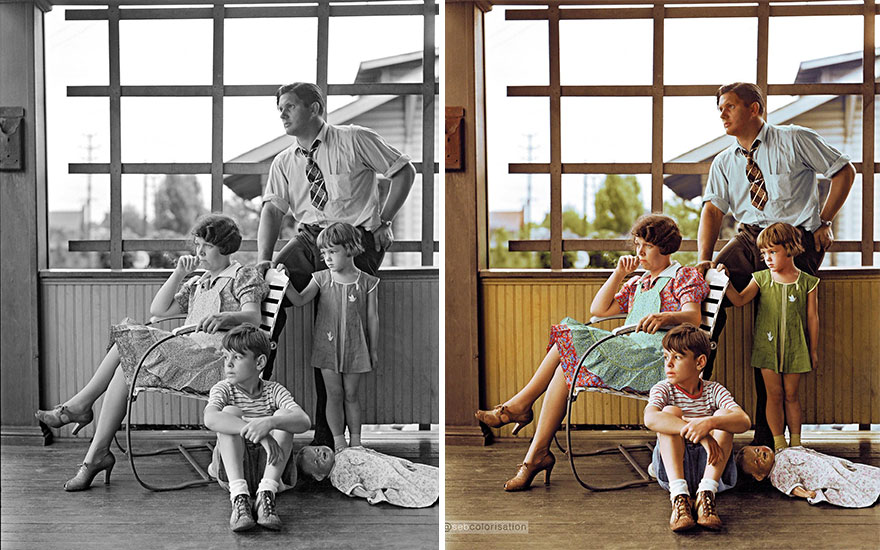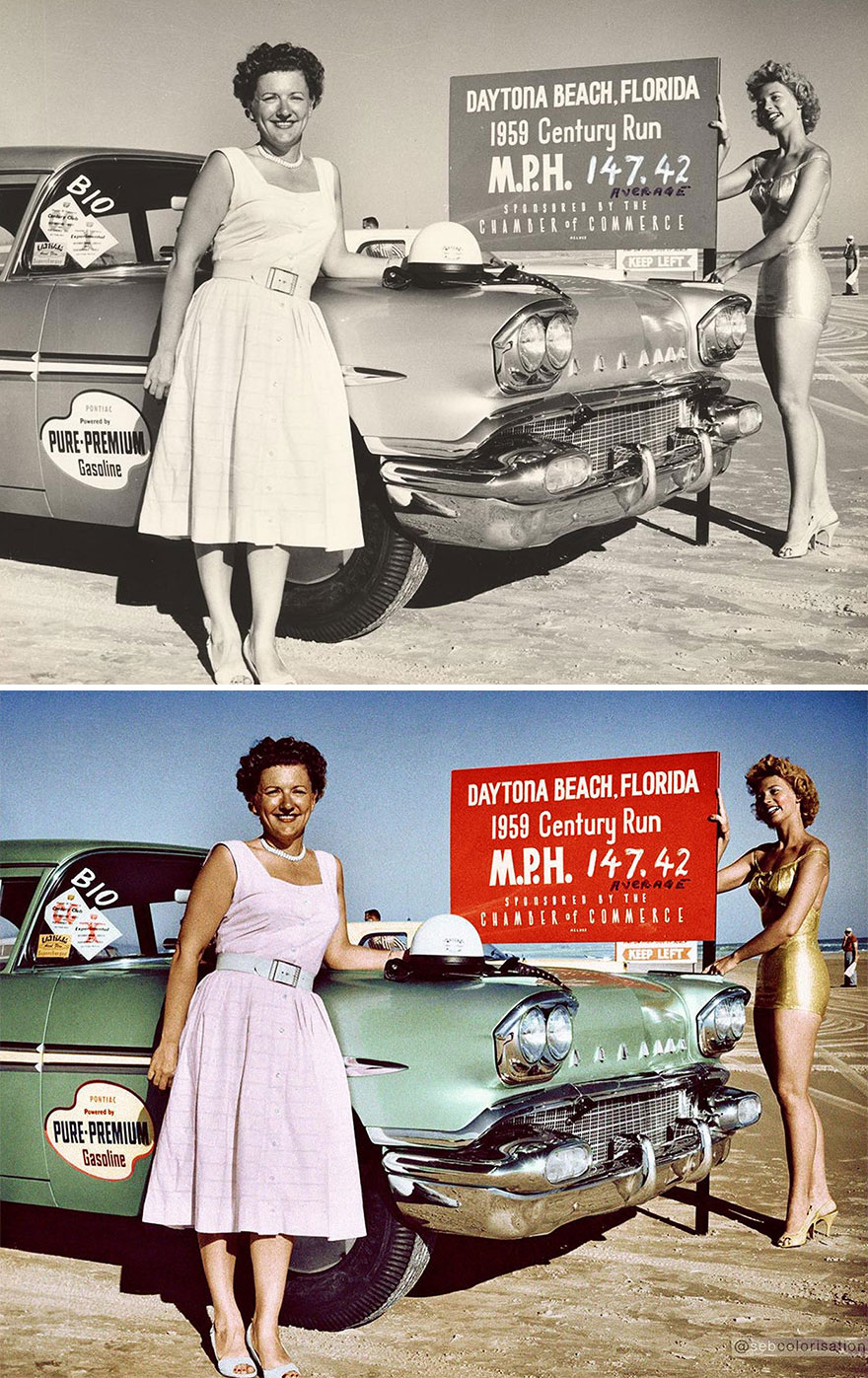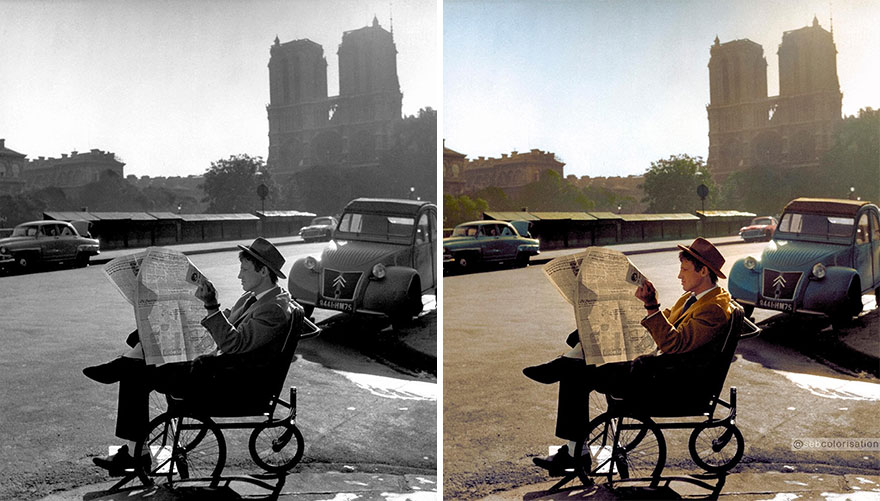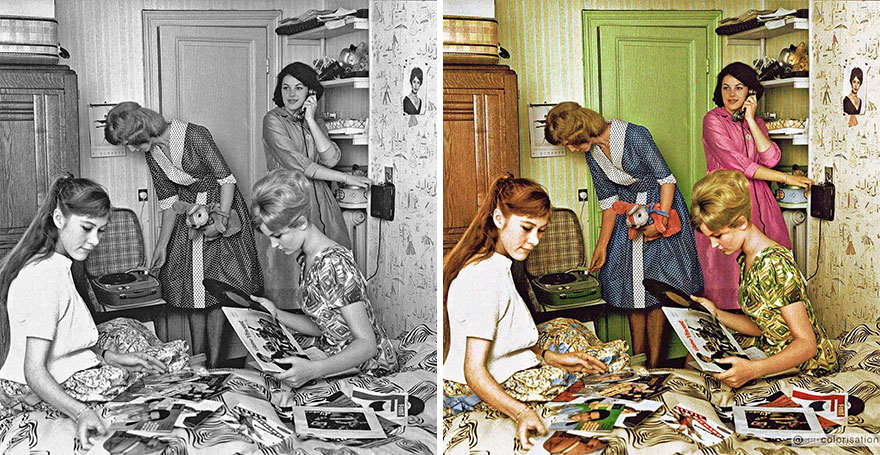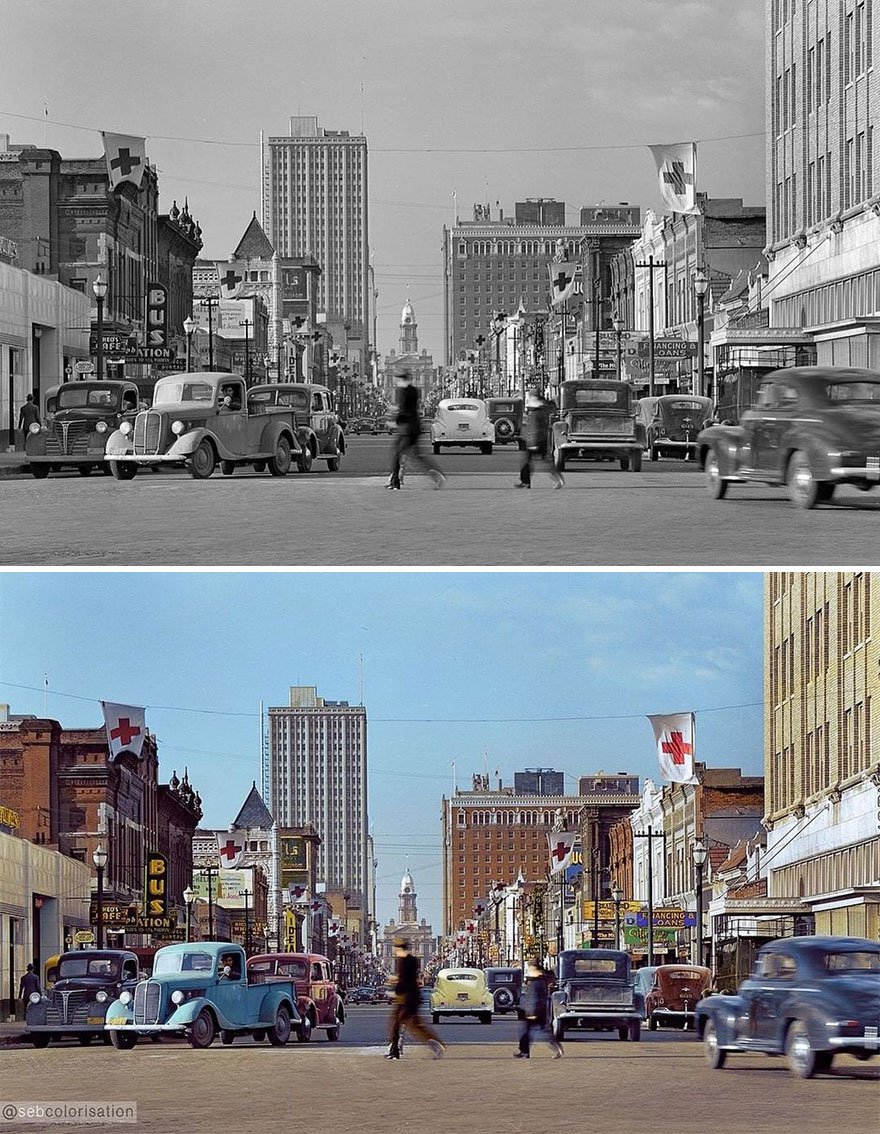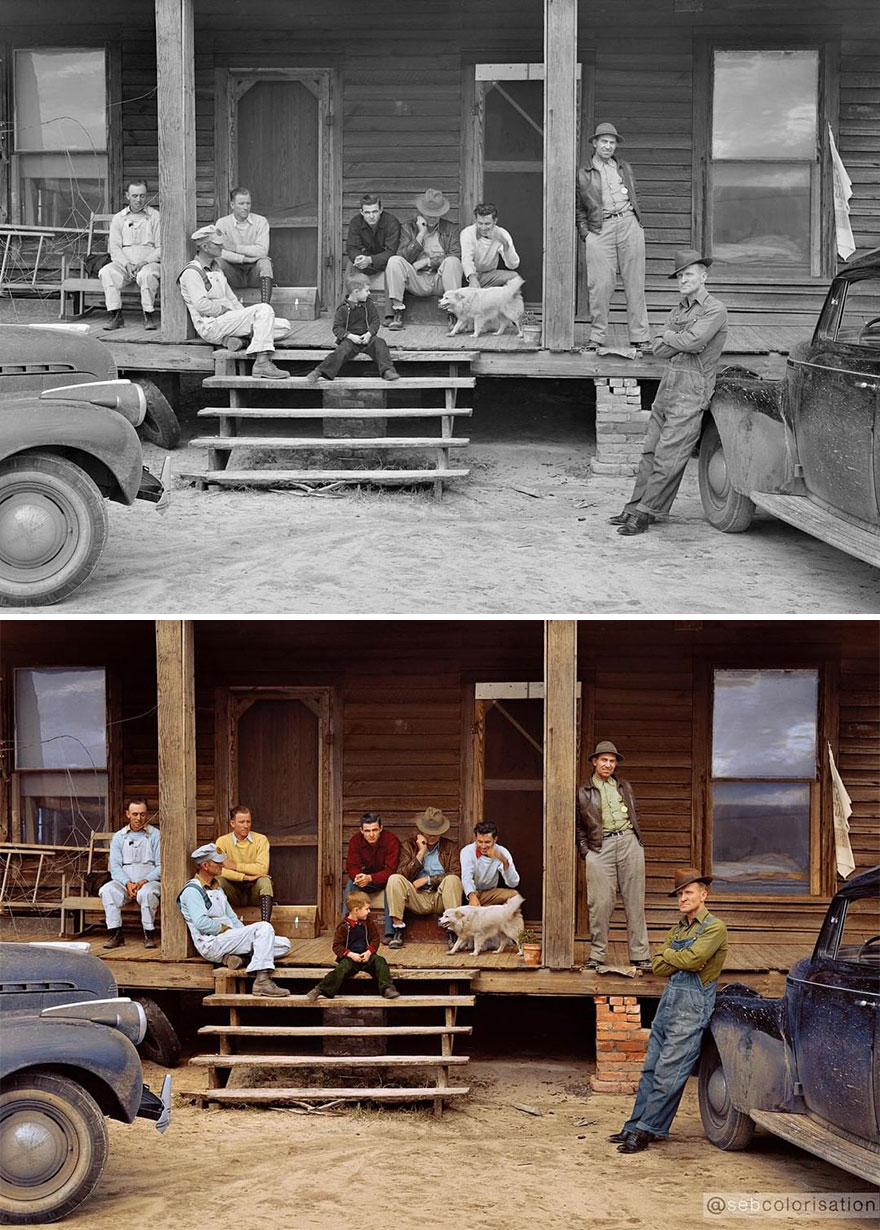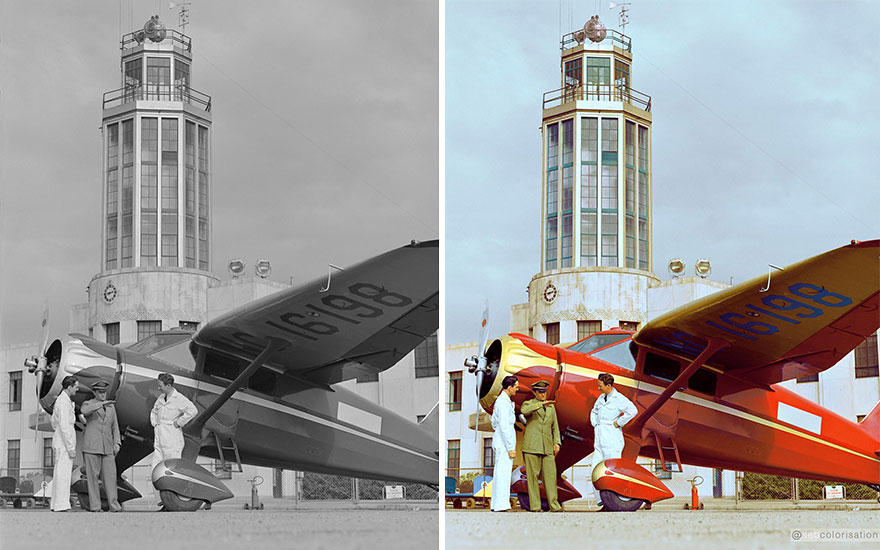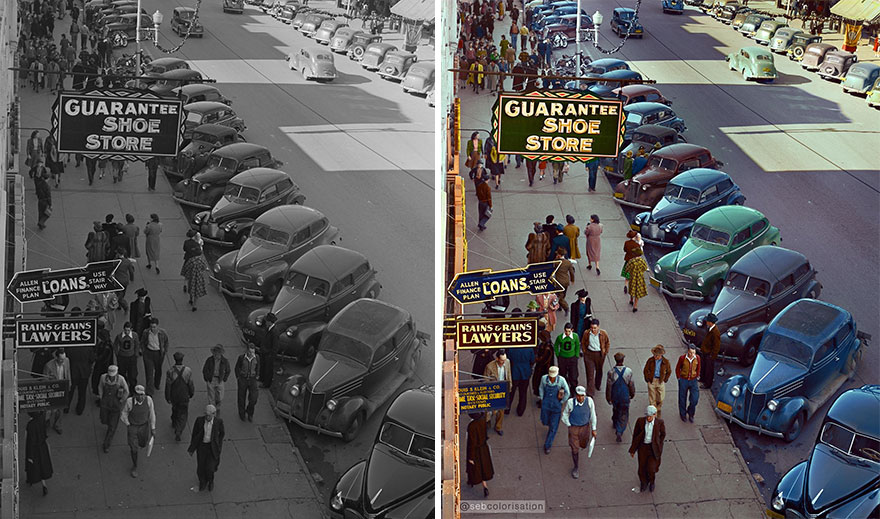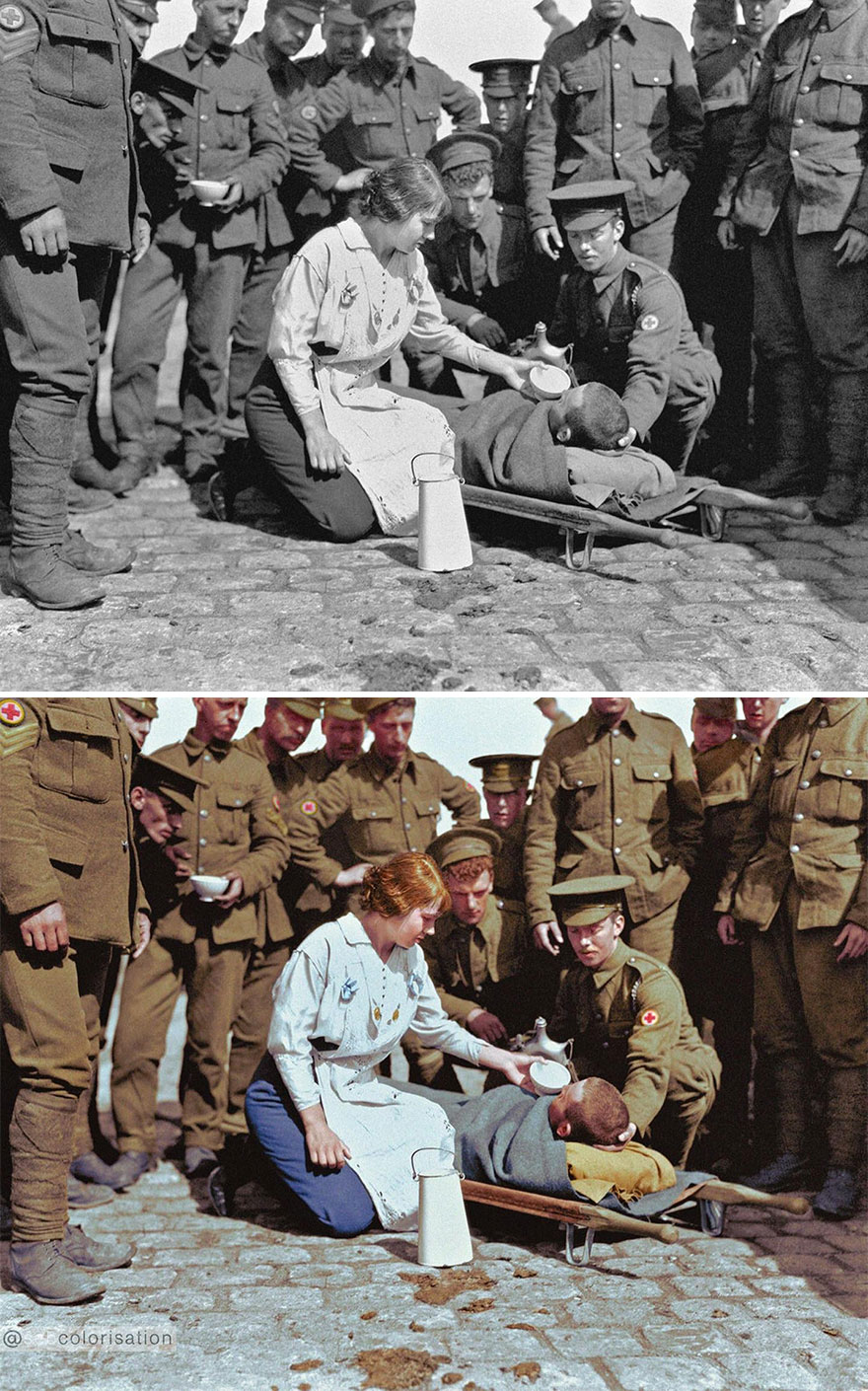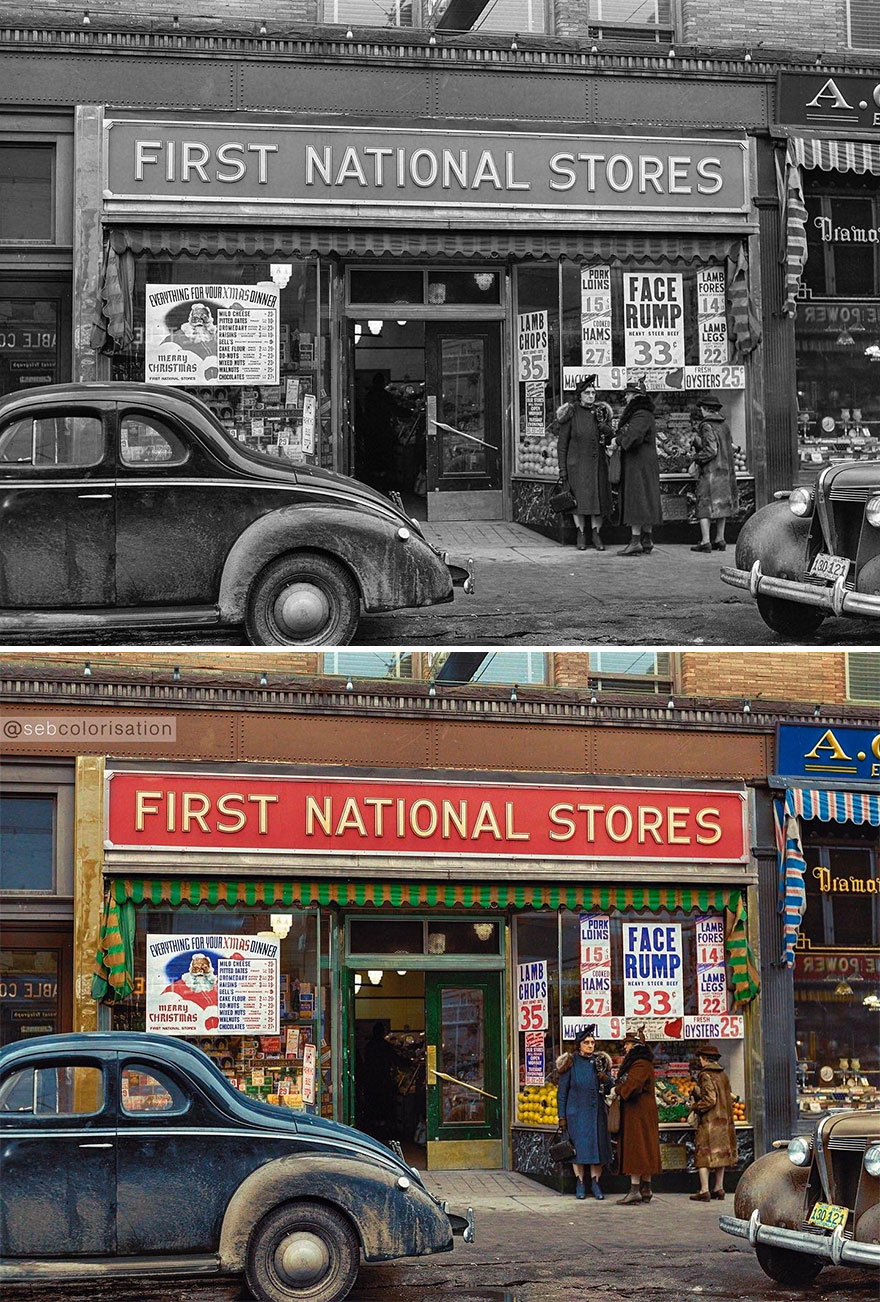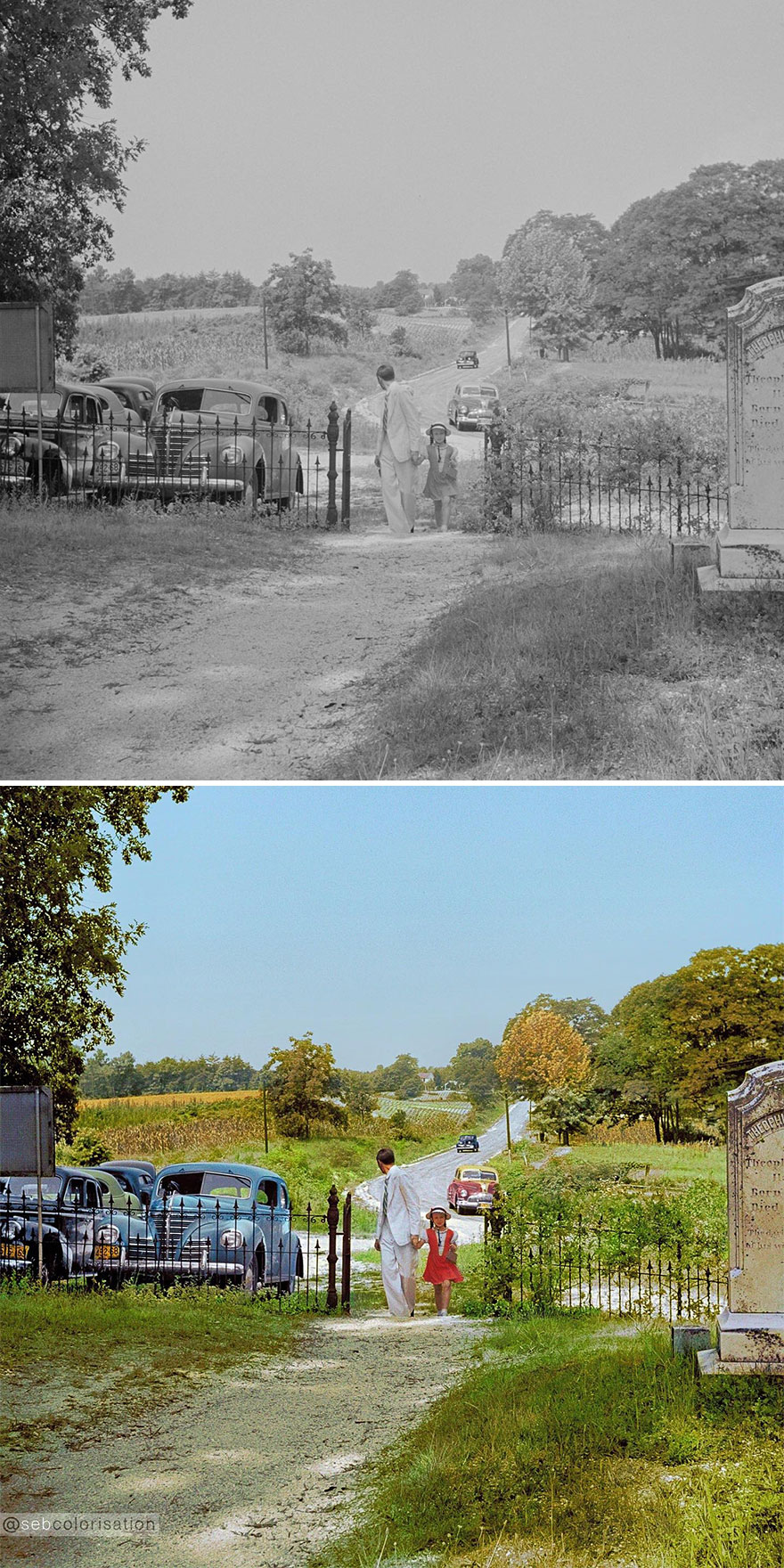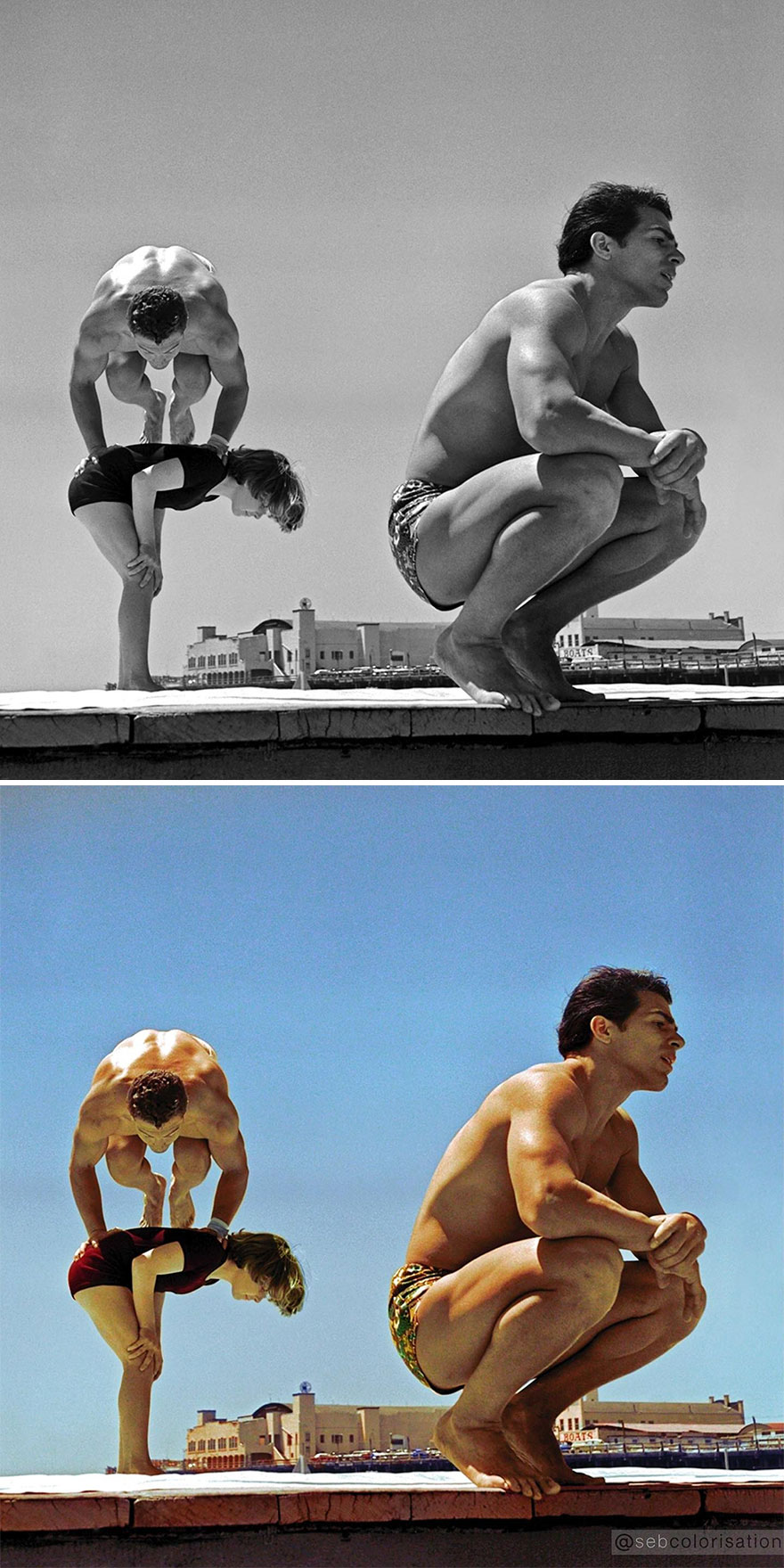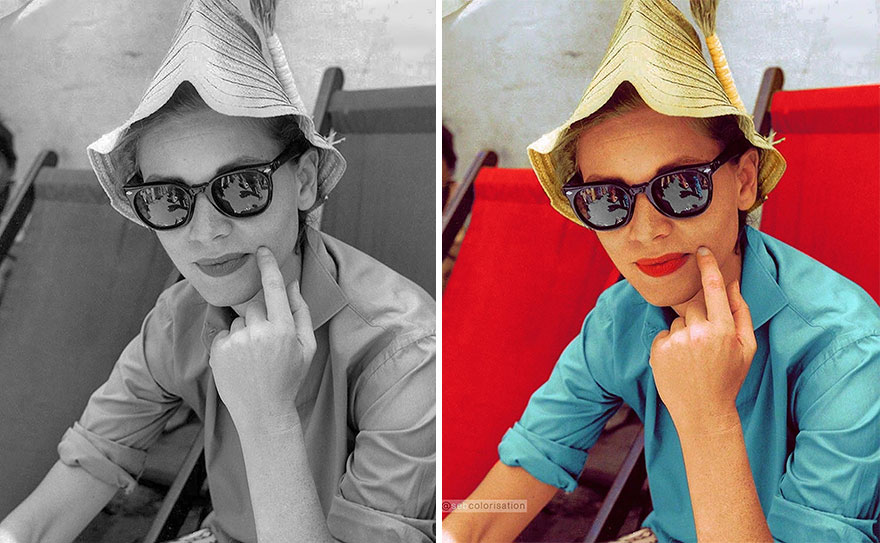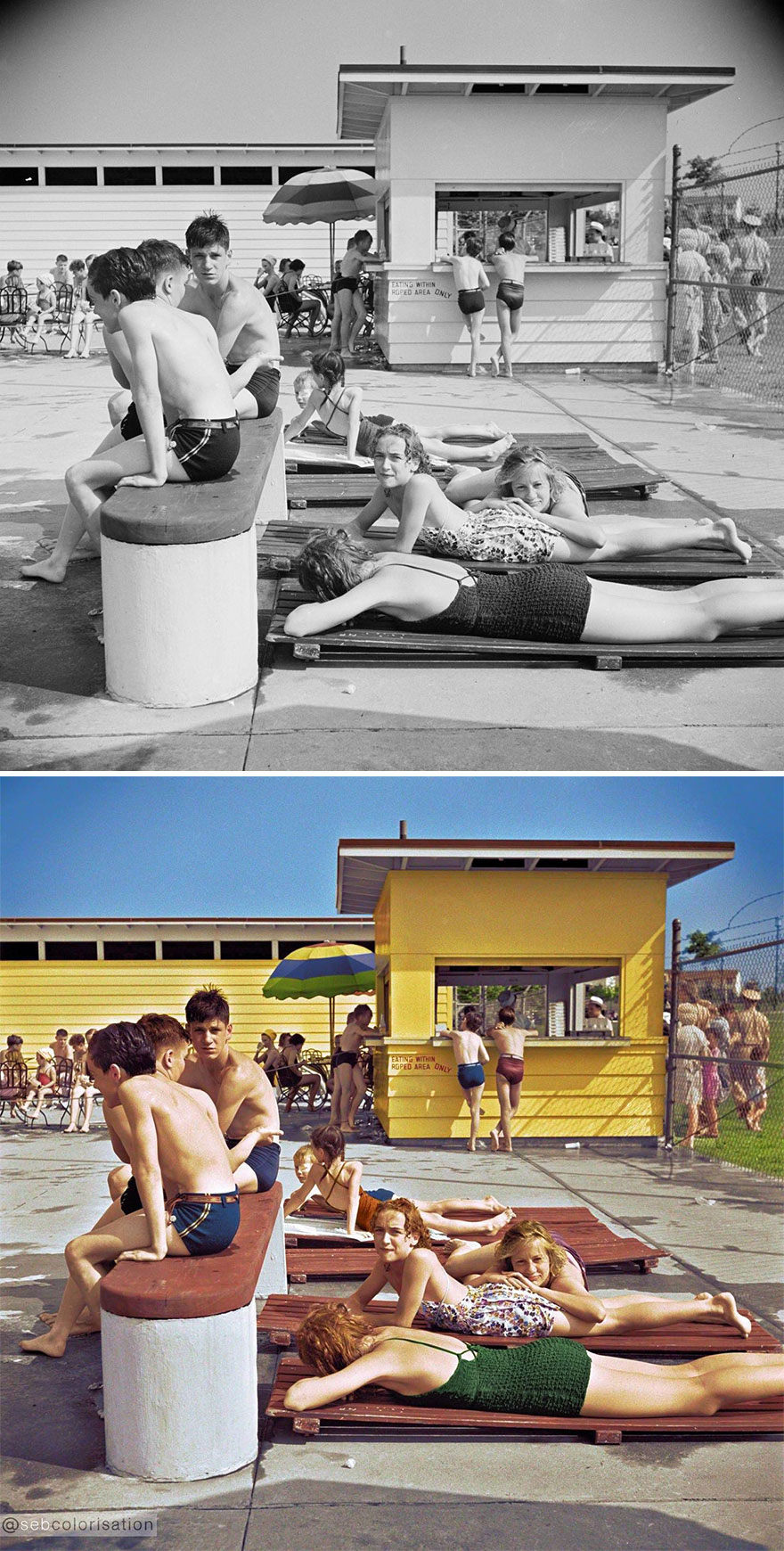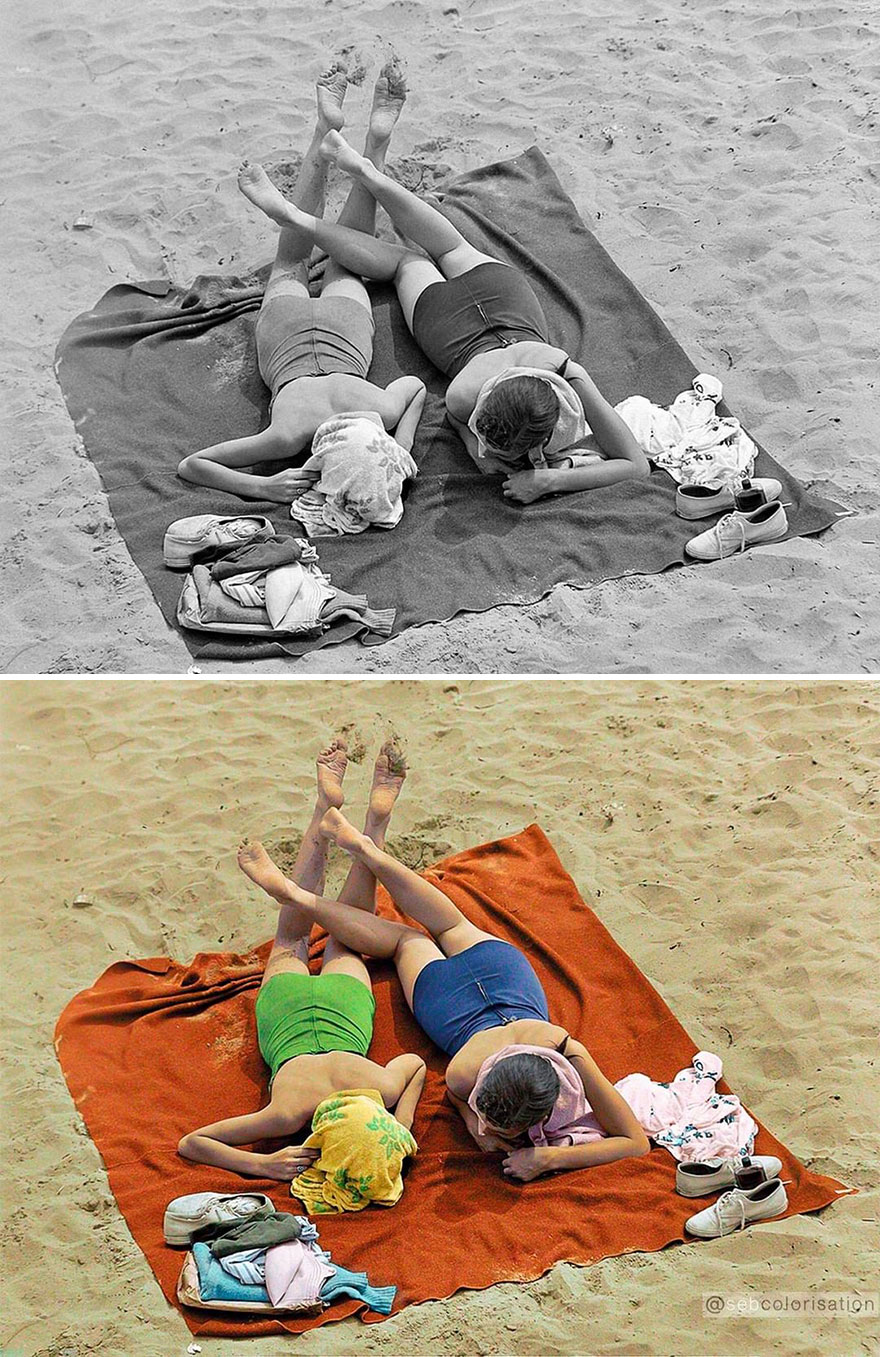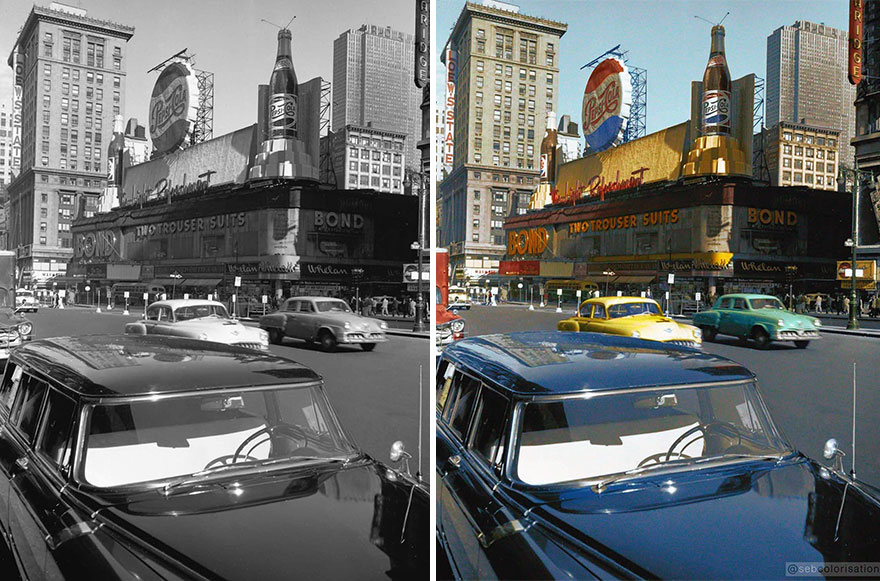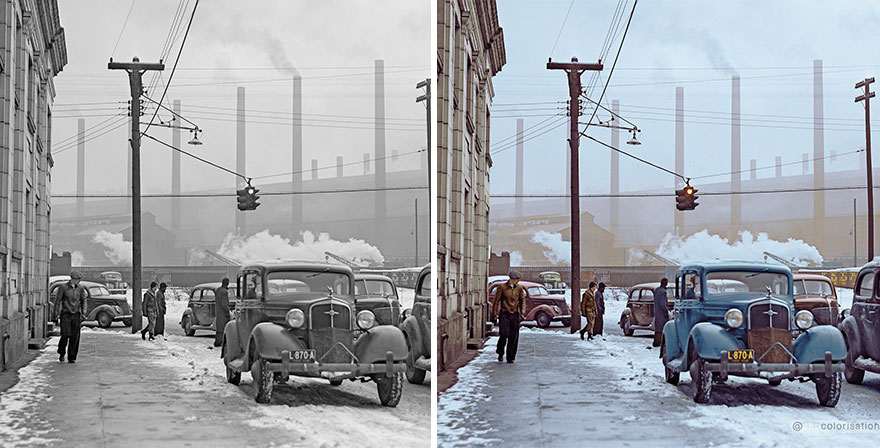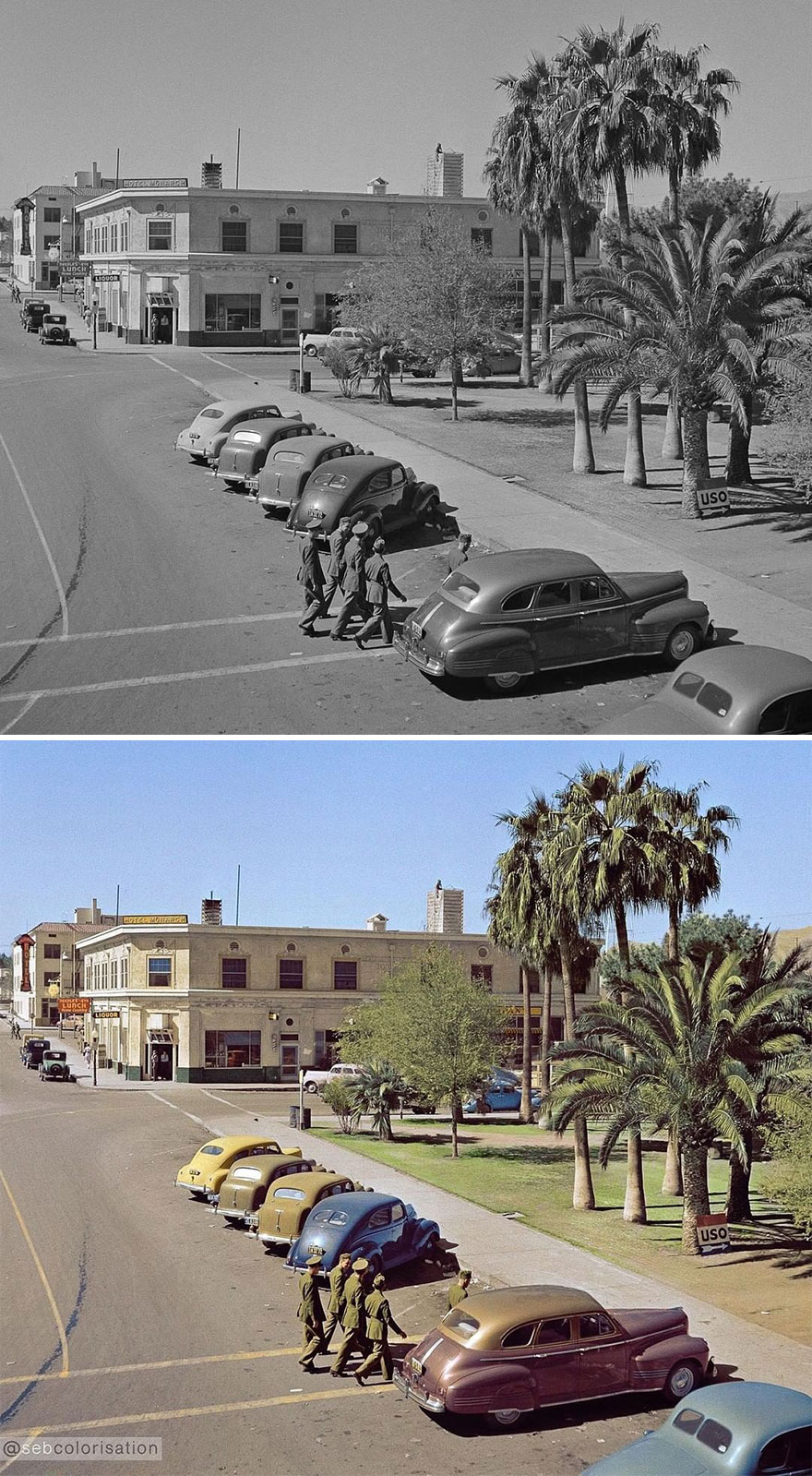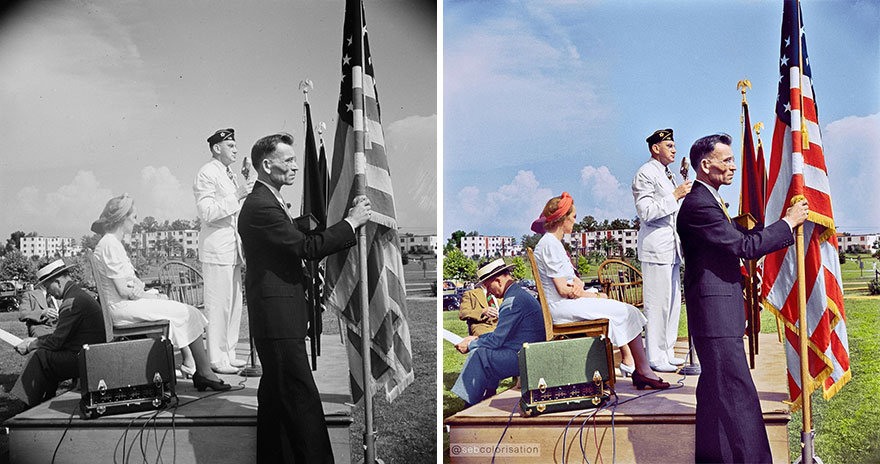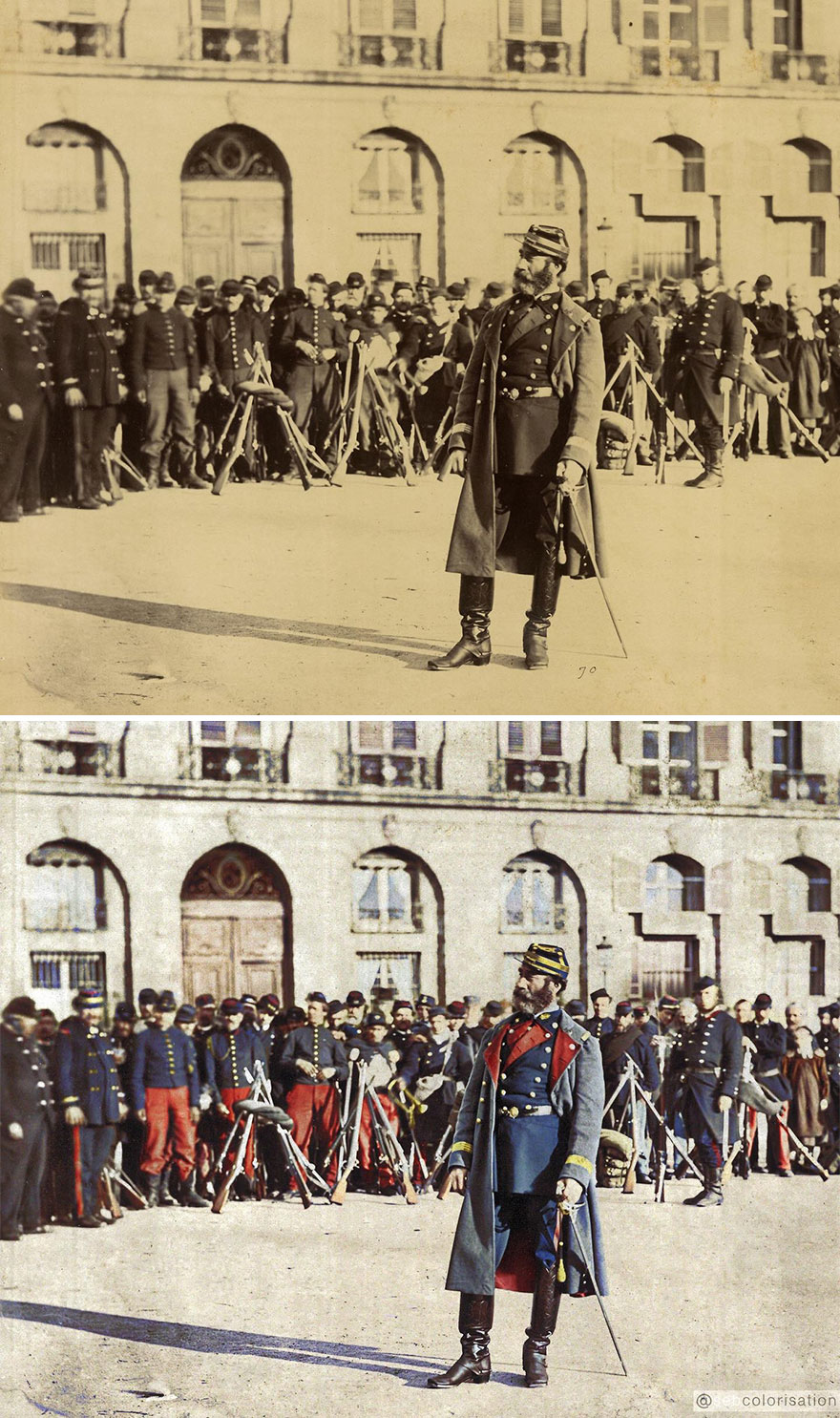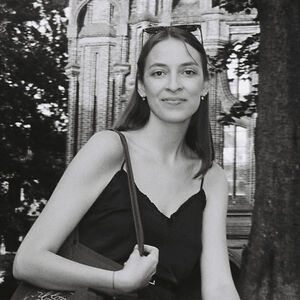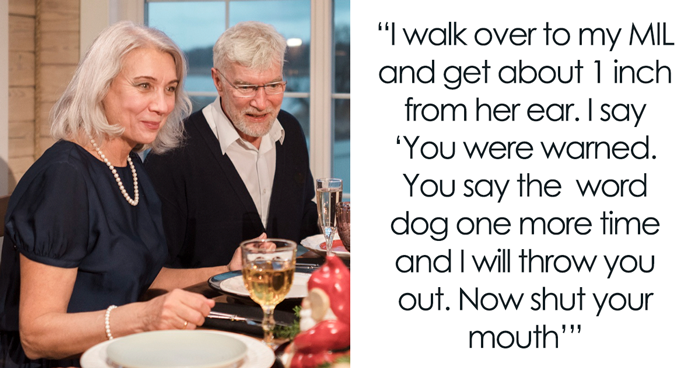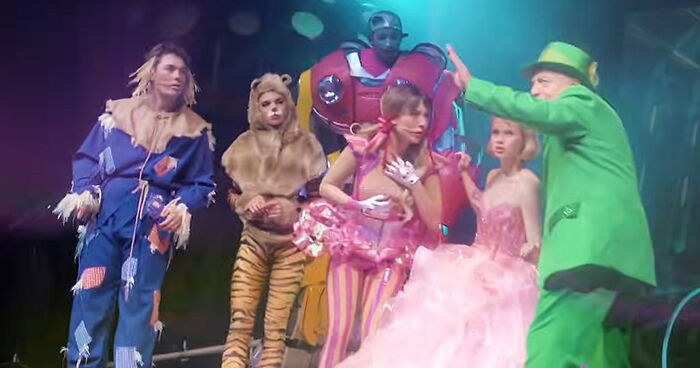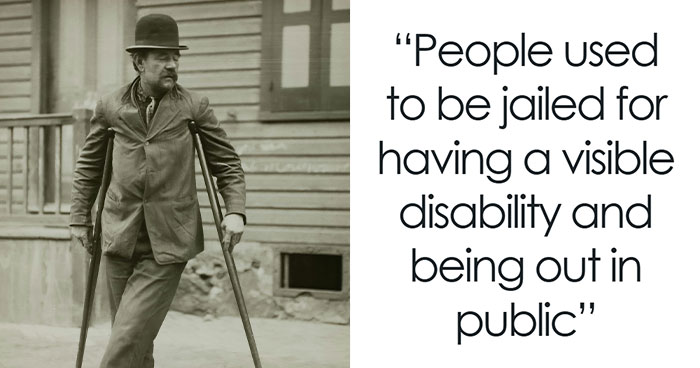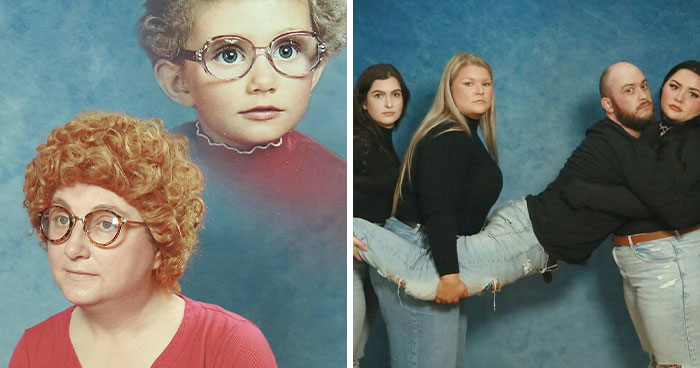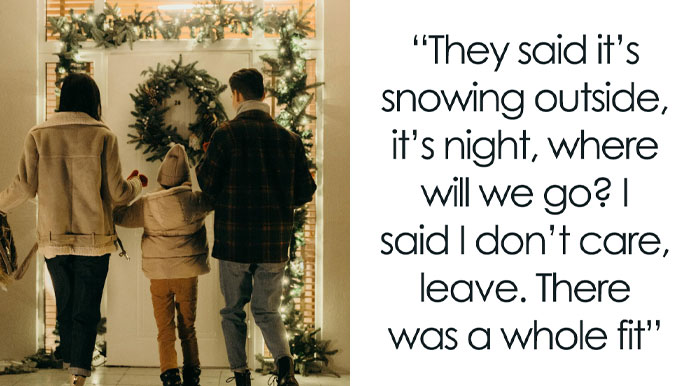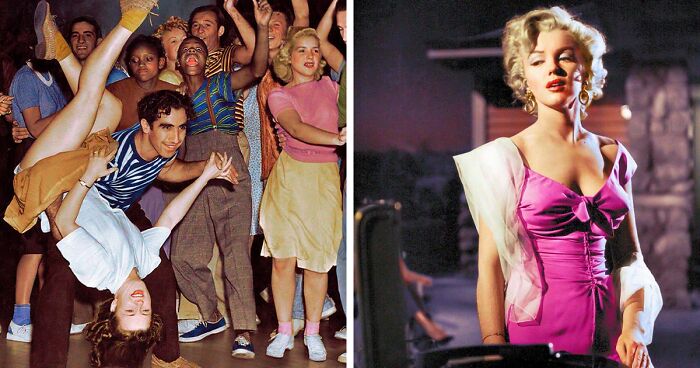
40 Old Colorized Photos That Might Change The Way You Perceive History By Sebastien De Oliveira (New Pics)
Interview With ArtistLooking at old black-and-white photos, have you ever wondered what people and things were really like back then? Well, of course, nowadays we have a lot of easily accessible sources providing us with all the information we need. However, it is probably impossible to fully understand a period in which we didn't exist yet.
To give you a better idea of the reality back in the day, we want to show you some works of Sebastien de Oliveira. He is an illustrator and a photographer who can resurrect the past in new colors. Literally. With the help of Photoshop, the artist colorizes old photos, giving them more life.
For more of Sebastien's colorized pictures, check out our previous post here.
More info: Instagram
This post may include affiliate links.
A Woman Driving A Sports Car Around Hollywood With Thor The Great Dane Riding Shotgun, 1961. Photographed By Ralph Crane
Bored Panda got in touch with Sebastien again to get to know more about him and his creative process. The artist shared that he is nearly at a thousand images colorized by now! That's an impressive number, so we got curious about whether his colorizing technique has changed over time. The artist replied that after the first three years where he was experimenting, he needed to crystallize the process in order to be liberated from the "how to do it" and to concentrate on the choices of colors or the general atmospheres he wanted to show.
"My technique is polished now so basically I don’t need to think about it. It doesn’t mean I don’t make efforts to improve it but the more technical parts are completely automatic for me now, so I really only think about the artistic choices and the ways to go further on the time machine effect."
Frida Kahlo On A Small Boat At Xochimilco, Mexico, Photographed In 1936
Amelia Earhart, Photographed In 1932
Sebastien colorizes images that depict people, actions, or feelings and when they tell a little story: "I see the possibilities in the original image, also with basic elements like trees, sea, or sand, to already imagine what color it will be and try to figure out a way to equilibrate the future colorization. I always go to see the Library of Congress and the FSA collection, of course, but I can be inspired by other Instagram accounts that give me ideas, like @classy_badasssery for instance, that have lots of cool images. Otherwise, it is just during random surfing on the internet. It is rare that people give me an image to colorize but it has happened, and it’s always a joy to see people seeing their ancestors in color for the first time!"
Photographer Harry Adams Stands With A Young Woman In Front Of His Barbershop. Los Angeles, 1956
Brigitte Bardot In A Boat, 1959
Sebastien revealed that until now, colorizing was only a hobby that he was taking "way too seriously". "My real job is a retoucher for the fashion industry in Paris. I can take some commissions if the subjects and the images are interesting. I just began a collaboration with the magazine France-Amérique in New York for illustrating an article. Recently colorization took a bigger place in my occupations."
Manis The Orangutan And Clint Eastwood, Behind The Scenes Of The Film "Every Which Way But Loose " By James Fargo (1978)
Hal And Betty Takier, Jitterbug Dancing 1938
Sebastien makes everything on Photoshop. Here's how he describes his process: "the process is quite simple and complex at the same time, first restoring the original monochrome image, cleaning the dust and scratches and preparing it to receive the color layer. Second, creating paths to be able to select all the different elements in the image means spending time on clipping. After that, the moment arrives to choose the colors to put on top of the black and white image. The fourth step will be my special treatment, I take a scale of five grey and I color it in a way to give every tone of color a different orientation. For making it simple, the same color will be more blue in the dark and more yellow in the light, it gives a natural tone to the image. Other settings are required for giving the color a more saturated and solid aspect. I finish with a color grain in the overall surface of the image to give another argentic aspect."
February 9, 1927. Washington, D.c. Miss Grace Wagner, Central High School
Marilyn Monroe In The Henry Hathaway's Film "Niagara", 1953
"You've got to start laying plans for a dress like that when you're thirteen."
"With all the different aspects of the process, it can take quite some time to colorize a picture but it really depends on the subject. If it is only a portrait with no complicated background it can be only an hour and if it is a street with cars and people it can be several hours. My job as a retoucher gave me the dexterity of working quite fast, it is what happened when you work on the same program for 8 hours a day for the last 18 years."
James Dean Signs Autographs In His Car In Marfa, Texas, Photographed By Richard C. Miller, In July 1955
Actress Cathy O'donnell, 1945. Photographed By Martha Holmes For Life And Time Pictures
The artist also shared that his book "Back to America!" has just been released in France! "I worked on it from the beginning of the year and it compiles 180 colorized images from the ’40s. It is such a great accomplishment for me that now I have difficulties imagining what will happen after that, another book maybe, other collaborations for articles, it seems to be only the beginning of the adventure."
If you're interested, you can order the book here.
Parisians On A Bus, Photographed In 1951
Anonymous Couple Photographed In 1942
Richmond, Virginia, Circa 1908
Actress Katharine Hepburn, 1907-2003. Photographed By Alfred Eisenstaedt In 1937
Veteran Soldier Of Napoleon With His Old Uniform On The Anniversary Of Napoleon's Death. Photographed In 1858
Diane Keaton And Al Pacino On The Set Of The Godfather By Francis Ford Coppola In 1972
Couple Kissing In The Front Seat Of A Convertible Car At A Drive-In Movie. Photographed In 1945
Soldier And His Girlfriend Waiting For A Train At Chicago Union Station, Photographed By Jack Delano In February 1943
Wow, I didn't know those types of cute boots have been around for a long time!
Marlon Brando Photographed By Ed Clark In 1949
Students Of The University Of Maryland Photographed In 1923
Model Wearing Suse Dannenburg 'Jezebel' Sweater, Photographed By Nina Leen For Life Magazine, 1947
Drought Refugees, California, Photographed By Dorothea Lange In February 1936
Taxi Driver, Place Pigalle, 1958. Photographed By Paul Almasy
Folies Pigalle was still open 15 years ago, as a night club somewhat trash ( lot of drugs fond behind the bar led to its closing by justice) It was a crazy place though by the time ( Miss Trans contest, with candidates dancing in suspended cages for instance)
Marilyn Monroe And Jane Russell Photographed On The Set Of "Gentlemen Prefer Blondes", Around 1953
8th Of October 1963: British Actor Sean Connery Lounges On A Sofa With A Cigarette
Photographed In 1936 By The French Photographer Pierre Jamet
Photographed By Pierre Jamet In 1936
April 17, 1935. Pontiac Convertible Coupe At Tanforan Racetrack, San Bruno
Miss Lenora Rivero With Anthony Jannus In Rex Smith Aeroplane, 1911
Elegant Thérèse Bonney, Taking The Train, With Vuitton Luggage, 1928
Lauren Bacall, Photographed In 1942
American Women Workers Serving Algerian Fusiliers With Sandwiches At The American Red Cross Military Canteen At Juvisy, 1918
Little Fisherman, Gloucester, Massachusetts, Photographed By Howard Liberman In September 1942
Man Changing A Tire, New York, Photographed In 1946 By Stanley Kubrick
Robert De Niro Photographed On The Set Of The Film "Taxi Driver" By Martin Scorcese, 1976
Central Park Lake On A Sunday, New York, Photographed By Marjory Collins In September 1942
It is so wild seeing people in suits and dresses hanging out at the lake.
College Boys Trying To "Thumb" A Ride Home Over The Weekend, Near Natchitoches, Louisiana. Photographed By Marion Post Wolcott In June 1940
For those wondering how to say the name of this town, it's "nack-uh-dish."
A Norwegian Sailor And An Oswego Girl On A Hayride During Unites Nations Week, Oswego, New York. Photographed By Marjory Collins In June 1943
Couple Kissing At The Cinema, Photographed By Weegee In 1943
Washington, D.c., Circa 1861. Guards At The Ferry Landing On Mason's Island Examining A Pass. Taken By George N. Barnard
Actress Louise Brooks Lounging On A Large Armchair. Photographed By Eugene Robert Richee In 1928
Massachusetts Bathing Girls, Revere Beach 1946
Mrs. Bliven In Auto, Washington, D.c., 1908
Writer Rose Lee, Working At Her Desk, Photographed In 1941
Soldiers And A Girl At The Fun Fair, Paris, 1960, Photographed By Paul Almasy
Two legionnaires one in parade uniform and the other in combat fatigues. Don't know wat the naval uniform is.
August 4, 1938. Washington, D.c. Miss Dorothy Parker Has Been Selected As Miss Washington And Will Compete For The Title Of Miss America At The Atlantic City Beauty Pageant
Washington, D.c., Circa 1917
February 1940. Basketball Players, Eufaula, Oklahoma. Photo By Russell Lee
Clifford Shorts And His Family, Aliquippa, Pennsylvania, Photographed By Arthur Rothstein In July 1938
Vicki Wood, The Fastest Woman On The Beach In The Late 1950s And Early 1960s
In my day "fast" meant something else so I did not see the woman in the foreground (pink dress) first 🤭 Oops
French Actor Jean-Paul Belmondo, Having A Break During The Filming Of "Breathless " From Jean-Luc Godard, Paris, 1960
Girls Listening To Music, Circa 1960
Fort Worth, Texas. View Of Main Street Photographed By Arthur Rothstein In January 1942
Construction Workers On The Porch Of A Local Boarding House Near Fort Benning, Columbus, Georgia. Photographed By Marion Post Wolcott In December 1940
Fort Worth, Texas. Meacham Field. Students And Instructor. Control Tower In The Background. Photographed By Arthur Rothstein In January 1942
Christmas Shopping Crowds, Gadsden, Alabama, Photographed By John Vachon In December 1940
Civilians And Soldiers Of The Royal Army. Medical Corps Distributing Refreshments The Wounded British In France, 1916
If I’m ever injured I hope a hoard of people don’t gather round to gawp at me…
December 1940. Grocery Store Window In Bath, Maine
Saint Mary’s Count, Maryland. People Going To All Faith Church. Photographed By Marjory Collins In July 1942
Meet The "World’s Strongest Seventh Grader" April Atkins 12 Years, Photographed By Loomis Dean In 1954
Lauren Bacall 1924-2014
Sunbathers At The Swimming Pool, Greenbelt, Maryland. Photographed By Marjory Collins In June 1942
Two Girls Sunbathing At The Revere Beach, Massachusetts, Photographed By Leslie Jones In 1937
Street View Of New York, Photographed By Pierre Chapo In 1956
Cars Of Steelworkers Leaving Mill, Midland, Pennsylvania, USA, Jack Delano, January 1940
A General View Of A Street Leading To The Depot Of The Atchison, Topeka, And Santa Fe Railroad, Needles, California, Photographed By Jack Delano In March 1943
Dr. Mccarl As A Chairman Of The American Legion Committee For The Memorial Day Ceremonies Opened The Program. Photographed By Marjory Collins In May 1942
Love this kinda stuff. I'm always curious how they detail the colours of details from black and white pictures?
Besides researching for references, I think there might be some ways to give away the color, or at least the tone by the shade of gray they have, at least an approximation. Besides with today's technology it must be easier to reverse engineer that with a computer, maybe some AI software.
Load More Replies...How does colourising balance and white photos change the way you perceive history? They're pretty, but what does it add to the original? And why are the colours all slightly muted? This was the age of the most brightly coloured early plastics and full-on chemical dyes for clothing.
Love this kinda stuff. I'm always curious how they detail the colours of details from black and white pictures?
Besides researching for references, I think there might be some ways to give away the color, or at least the tone by the shade of gray they have, at least an approximation. Besides with today's technology it must be easier to reverse engineer that with a computer, maybe some AI software.
Load More Replies...How does colourising balance and white photos change the way you perceive history? They're pretty, but what does it add to the original? And why are the colours all slightly muted? This was the age of the most brightly coloured early plastics and full-on chemical dyes for clothing.

 Dark Mode
Dark Mode 

 No fees, cancel anytime
No fees, cancel anytime 






